Mr. Punky Kitten
Speaking truth to old-stream media bias.
Saturday, February 27, 2010
Reuters Acknowledges That It Isn’t Getting Any Warmer
Climate scientists must do more to work out how exceptionally cold winters or a dip in world temperatures fit their theories of global warming, if they are to persuade an increasingly sceptical public.
At stake is public belief that greenhouse gas emissions are warming the planet, and political momentum to act as governments struggle to agree a climate treaty which could direct trillions of dollars into renewable energy, away from fossil fuels.
Public conviction of global warming's risks may have been undermined by an error [i.e., an outrageous lie] in a U.N. panel report exaggerating the pace of melt of Himalayan glaciers and by the disclosure of hacked emails revealing scientists sniping at sceptics, who leapt on these as evidence of data fixing.
Friday, February 26, 2010
CNN Poll: 65% of Americans say the government poses an immediate threat to individual rights and freedoms.
From CNN Deputy Political Director Paul Steinhauser
Washington (CNN) – A majority of Americans think the federal government poses a threat to rights of Americans, according to a new national poll.
Fifty-six percent of people questioned in a CNN/Opinion Research Corporation survey released Friday say they think the federal government's become so large and powerful that it poses an immediate threat to the rights and freedoms of ordinary citizens. Forty-four percent of those polled disagree.
The survey indicates a partisan divide on the question: only 37 percent of Democrats, 63 percent of Independents and nearly 7 in 10 Republicans say the federal government poses a threat to the rights of Americans.
According to CNN poll numbers released Sunday, Americans overwhelmingly think that the U.S. government is broken - though the public overwhelmingly holds out hope that what's broken can be fixed.
The CNN/Opinion Research Corporation poll was conducted February 12-15, with 1,023 adult Americans questioned by telephone. The survey's sampling error is plus or minus 3 percentage points for the overall survey.
The Top 20 Quotes From CPAC 2010
link
20) Against the advice of my wife, I endorsed Arlen Specter. I should have listened to my wife. -- Rick Santorum
19) These days, even a moderate Democrat is someone who thinks you shouldn't be taught fisting until you're at least 12 years old. -- Ann Coulter
18) It's interesting how Obama's adorers in the press keep comparing him to Lincoln and Reagan. Apparently they can't think of a Democrat president worthy of being compared to. -- Ann Coulter
17) Some folks like to call us the party of 'no.' Well, I say 'no' is way underrated in Washington, D.C. Sometimes 'no' is just what this town needs to hear.
When it comes to more borrowing, the answer is no. When it comes to more spending, the answer is no. When it comes to more bailouts, the answer is no. And when it comes to a government takeover of health care, the answer is no.
Conservative Republicans are back. We're in the fight for fiscal discipline and limited government, and we are on the side of the American people. -- Mike Pence
16) Scott Brown's victory in Massachusetts has got to have Ted Kennedy rolling over in his grave, spilling his drink. -- Ann Coulter
15) Obama sees America as another country on the UN role call. Somewhere between Albania and Zimbabwe. -- John Bolton
14) It's an equal playing field on the internet. But the left cannot, will not win on the radio. No one is surprised, who wants to listen to that for hours?! Air America has shut down and Gitmo is still open. -- Erick Erickson
13) (CPAC is like Woodstock) except that unlike the last gathering, our women are beautiful, we speak in complete sentences and our notion of freedom doesn't consist of cocaine, which is certainly one thing that separates us from Barack Obama. -- Jason Mattera
12) CNN calls (Tea partiers) tea baggers which is the gayest term I've heard on CNN except for Anderson Cooper. -- Ann Coulter
11) (Republicans) must come to us and show us they are worthy of our loyalty. We will be aware of your penchant for drinking backsliders' wine" on issues such as spending. I'm from Texas. We don't call you a cowboy until we see you ride. -- Dick Armey
10) Feminism's ultimate success is that we don't need it anymore. -- SE Cupp
9) Now, look, it's true, Americans do want leaders that will come to Washington, D.C. and work together to get things done, but that comes with a very important caveat, it depends what they're trying to do. If they're working to lower tax rates, simplify the tax code, they want us to work together. If they're working to get control of a runaway of a federal debt and annual deficits, they want us to work together.
If they're working to defeat radical Islam and the threat that it poses through terrorism, they want us to work together.
However, however, if the goal is to abandon America's free enterprise economy, if the goal is to convert America into a submissive member of the international community, if the goal is not to fix America, but to change America, then they want leaders that are going to come up here and fight it every step of the way. -- Marco Rubio
8) In case you didn't hear the late-breaking news, the gold medal in the downhill was taken away from American Lindsey Vonn. It was determined that President Obama is going downhill faster than she is. -- Mitt Romney
7) I think we can learn a lot from that situation, not from Tiger but from his wife. She said, 'I've had enough.' She said, 'No more.' I think we should should take a page out of her playbook and take a nine iron and smash the window out of big government in this country. -- Tim Pawlenty
6) The upside of cap and trade will be that if we pass it and defeat global warming, Washington D.C. will see snow again! -- Ann Coulter
5) I think President Obama is going to be a one-term president. -- Dick Cheney
4) Not a single time have we gotten our rights from Congress or the President, we get them from God. And when He gives us those rights, He puts a warning bell inside of us. When somebody tries to take them, a warning bell goes off. And that's what America is feeling right now. -- Glenn Beck
3) You know, a week ago we didn't know we were going to make it here. We were watching the -- all the images of that winter weather, the extraordinary blizzard that even impacted government. I don't know if you know this, but the Congress couldn't meet to vote on bills. The regulatory agencies couldn't meet to set any regulations, either. And the president couldn't find anywhere to set up a teleprompter to announce new taxes.
You know, now that I come to think of it, the blizzard may be the best thing to happen to the American economy in 12 months. -- Marco Rubio
2) 40% of Americans consider themselves conservatives, 36% say they're moderates. 20% say their liberals. How are they making 76% feel like they're the minority? The majority does not rule in America. But the minority shouldn't hijack it. -- Glenn Beck
1) And it may be a hard day and hard struggle, and we may work until late in the night, and our kids may be crying, and we may be losing our house we are going to go through some tough times. And we are going to be tired as we set things straight. It is a hard road, I know, I have walked it myself. It is a hard road, but we will make it, and at night we will be beat tired we will be so tired, but when we put our head down on our pillow to go to sleep again that night we can be happy because we know tomorrow it will again be morning in America. -- Glenn Beck
ABC News To Obama - You Lie!
Earlier today during the so called healthcare summit there was a back and forth between the TOTUS and Sen Lamar Alexander on whether health insurance premiums would actually go up or down under the Obamacare plan.
Well, it seems that Sen Alexander was right and your premiums would go up 10 - 13% and Barry O was once again, well, lying.
Both cite a Congressional Budget Office (CBO) analysis of the Senate bill done at the request of Senator Evan Bayh.
Who is right?
Well, the CBO analysis does say, flatly, that "the average premium per person covered (including dependents) for new nongroup policies would be about 10 percent to 13 percent higher in 2016 than the average premium for nongroup coverage in that same year under current law."
Why are premiums going up? CBO cites the combination of three factors:
1. Premiums would be 27-30% higher because coverage would be better. The law, for example, requires that all policies cover maternity care, prescription drugs, mental health & substance abuse and no denial of coverage for pre-existing conditions.
2. Premiums would be 7 to 10 percent lower b/c of changes to the way the individual market is structured.
3. Premiums would be 7 to 10 percent lower b/c of an influx of more people, many of them healthy, into the insurance market.
The net effect of those three factors: Premiums would be 10 to 13 percent higher for the average policyholders.
President Obama's claim of premium reductions of "14 to 20 percent" comes from adding factors two and three. The problem: You can't ignore factor one.
The Dems need to stick with their constant telling of sob stories, which any of us could probably tell, because when it comes to citing facts and figures they fail miserably.
Stock Market
Stock Market Report.......
Helium was up, feathers were down.
Paper was stationary.
Fluorescent tubing was dimmed in light trading.
Knives were up sharply.
Cow steered into a bull market.
Pencils lost a few points.
Hiking equipment was trailing.
Elevators rose, while escalators continued their slow decline.
Weights were up in heavy trading.
Light switches were off.
Mining equipment hit rock bottom.
Diapers remain unchanged.
Shipping lines stayed at an even keel.
The market for raisins dried up.
Coca Cola fizzled.
Caterpillar stock inched up a bit.
Sun peaked at midday.
Balloon prices were inflated.
And batteries exploded in an attempt to recharge the market
H/T DML
Privatizing helps, growth of the public sector hurts
Here's a must-read article on how privatizing retirement accounts in Chile saved the country from economic disaster.
This is an excellent article about the growth of the public sector, their unions and their drain on our economy.
Thursday, February 25, 2010
The Obama Economic Recovery Plan in One Simple, East-to-Understand Graph
http://americandigest.org/mt-archives/enemies_foreign_domestic/the_obama_economic_recove.php
The Obama Economic Recovery Plan in One Simple, East-to-Understand Graph
Any questions?
Update: Donald Sensing points out that this graph is "Sort of like Franklin Roosevelt's 1933 recovery plan. Published in 1933."
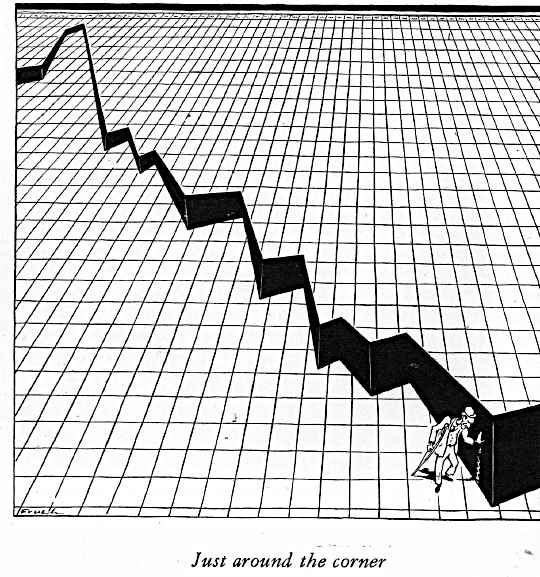
Which puts me in mind of a famous Minum, "The more things change, the more they stay insane."
Posted by Vanderleun at February 22, 2010 8:10 PMSomething Wonderful: New Looks for Old Garage Doors
Something Wonderful: New Looks for Old Garage Doors

Garage doors have until now mostly been mouse grey and ugly – and often spoil the appearance of well-maintained homes. But now, the days of those hideous garage doors are numbered! Online and availble from style-your-garage.com
Wednesday, February 24, 2010
CEI files suit against the EPA - good!
Most of last year featured furious argument over Obama's cap-and-trade scheme. The chief opposition to the complicated tax and rationing scheme was not congressional Republicans but the Competitive Enterprise Institute (CEI), another D.C.-based libertarian think tank. Led by former Environmental Protection Agency policy analyst Fred Smith, CEI has proved willing not only to argue against policies it disagrees with but to sue.
Last week CEI filed suit in federal appeals court challenging the EPA's forthcoming regulation of greenhouse gasses under the Clean Air Act. This came on the tail of a petition filed by CEI and a few other groups asking the EPA to reconsider its rule in light of the recent Climategate scandal. The idea isn't so much to win in court - though they would take a win, they assure me - but to gum up the works long enough for Alaska Senator Lisa Murkowski to get a resolution of disapproval through the Senate, which will then be used to force the EPA to back down.
http://www.realclearpolitics.com/articles/2010/02/23/quiet_libertarian_victories_104518.html
Tax reform, lowering corp tax rate from 35 to 24% - good!
The first comprehensive bipartisan tax reform bill since the Reagan era has been introduced in the Senate. It is being toted as a "jobs bill." Senator Ron Wyden (a Democrat from Oregon) and Senator Judd Gregg (a Republican from New Hampshire) want to streamline the tax code by cutting the number of income tax brackets in half and lower the corporate tax rate from 35% to 24%.
Finally! Let's hope it passes.
It's the Jobs, stupid!
Take a look at this. Be sure to hit the "Play" button. Watch the progression of unemployment across the country from January of 2007 until December of 2009. It looks like a cancer progressing through the country.
Now ... after you've looked at this unemployment graphic you can ask yourself why Obama and the Democrats are much much more dedicated to seizing control of our health care than they are taking some viable steps to get people back to work in the private sector again.
snow castle
http://hillbuzz.org/2010/02/23/breaking-parma-ohio-man-builds-castle-out-of-snow-proposes-to-girlfriend-she-says-yes/
UPDATE: Because so many of you wanted to see the Great Snow Castle of Parma, Robby's mom sent these in, from the Cleveland FOX affiliate:

The engaged couple, Ryan Knotek and Christi Lombardo
Palin
Politics is the art of the impossible, the last resort of fools, scam artists, prostitutes of all kinds, low-lifes, crooks and fanatics. Look at Washington, D.C. It's pretty damned obvious, right?
Which is why Sarah Palin is so important to America's well-being now and maybe for decades to come. The fact is that Obama is going to hang around for a long time, even if he gets defeated in 2012 — like Jimmy Carter, another egregious bankrupt of the left who won't walk off the stage. Jimmy turned out to be quite an evil man after he wiped off that big phony smile. Obama is going to be hanging on like a bad case of mononucleosis for decades to come. He has just signaled his real position in the political world by telling us that corrupt old Harry Reid is "on the right side of history," in spite of all the nasty stuff he routinely commits.
That is a pure, leftist definition of goodness. In this way of reckoning, Stalin and Lenin are "on the right side of history" — except maybe for killing 100,000,000 innocent human beings.
You can get away with a lot of bad stuff if you are on Obama's "right side of history."
The good part is that in the coming years, Obama will haunt the Democrats most of all. No Democrat will be able to run without the emperor's gracious nod. They're all going to be like Hillary, begging for Obama's favors, and they're going to hate it.
That's the fun part. On the other side, Obama is going to throw regular hatfuls of bat guano at the rest of us for decades to come. We are all on Obama's wrong side of history.
So America will need a headliner to counter Obama's famous brand of demagogy.
Sarah Palin can do it.
But why Palin and not any of the other candidates? Because Sarah Palin appeals in a more-than-rational way to all of us. You can make policy arguments for Palin as a GOP president. She is a solid, substantive, conservative thinker. She is open-minded about facts, unlike the current president — who just blocks out any evidence that doesn't fit his mental party line. The Democrats will never have an original thought. They can only switch from one demagogic cliche to another one.
But like Ronald Reagan, Palin adds something rare and special to a substantive understanding of life and politics.
The left voted for Obama because he was black and looked cute on TV. Their campaign was pure rock star; there was no substance at all. It might have been Michael Jackson up there and they would have gone gaga just the same.
Page 1 of 2 Next -> View as Single Page
James Lewis is a scientist by trade, and carps as a hobby about the passing parade of human fraud and folly.
Al Gore Is Lying Low -- for Good Reason
February 24, 2010
Al Gore Is Lying Low -- for Good Reason
By Rex McBrideRICO was written in broad terms. To state a claim, a plaintiff must allege four elements: (1) conduct (2) of an enterprise (3) through a pattern (4) of racketeering activity... Each element of a RICO claim requires additional analysis: an "enterprise" is marked by association and control; a "pattern" requires a showing of "continuity" -- continuous and related behavior that amounts to, or poses a threat of, continued criminal violations; and "racketeering activity" involves the violation of designated federal laws ...
Slate Mag: The Chemist's War
Are you ready to let these leftist/progressives control your lives?
The Chemist's War -- The little-told story of how the U.S. government poisoned alcohol during Prohibition with deadly consequences.
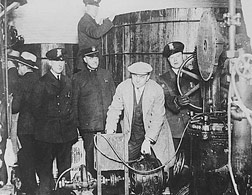
Gov employees make much more than the rest of us!
From CATO's Chris Edwards:

source: Employee Compensation in State and Local Governments (Jan. 2010)
Prior related post here. See also Carpe Diem relying on Bureau of Labor Statistics data.
(via February 13th Economist (subscription only))
Tuesday, February 23, 2010
Regulate the media
How to you feel about the escalating amount of money that is spent on our elections?
Here's an idea.
We hear all about how Obama and the Democrats want to regulate banks, auto companies, and now health insurance providers.
Well how about regulating the Media, and how much they charge for political 'spots' for advertising.
The media is full of fat cat moguls who get rich off of the rest of us!
That way, the money spent on elections will be less, if government regulates TV, radio, internet and newspaper media advertising.
Looking for a real discrepancy, look to government
Income angst? Not for public employees
By Jeff Jacoby Boston Globe Columnist / January 27, 2010http://www.boston.com/bostonglobe/editorial_opinion/oped/articles/2010/01/27/income_angst_not_for_public_employees/
LAST MONTH, the US economy shed another 85,000 jobs. It marked a miserable end to a calamitous year in which an estimated 4.2 million American jobs were liquidated, and unemployment rose to 10 percent. In addition, more than 920,000 "discouraged workers'' left the labor force entirely, having given up on finding work and therefore not included in official unemployment data.
Since December 2007, when the current downturn began, the ranks of federal employees earning $100,000 and up has skyrocketed. According to a recent analysis by USA Today, federal workers making six-figure salaries - not including overtime and bonuses - "jumped from 14 percent to 19 percent of civil servants during the recession's first 18 months.'' The surge has been especially pronounced among the highest-paid employees. At the Defense Department, for example, the number of civilian workers making $150,000 or more quintupled from 1,868 to 10,100. At the recession's start, the Transportation Department was paying only one person a salary of $170,000. Eighteen months later, 1,690 employees were drawing paychecks that size.
All the while, the federal government has been adding jobs at a 10,000-a-month clip. Between December 2007 and June 2009, federal payrolls exploded by nearly 10 percent. "Federal workers are enjoying an extraordinary boom time in pay and hiring,'' USA Today observes, "during a recession that has cost 7.3 million jobs in the private sector.'' And to add public-sector insult to private-sector injury, data from the Office of Personnel Management show the average federal salary is now roughly $71,000 - about 76 percent higher than the average private salary.
---------
Benefits widen public, private workers' pay gapThe pay gap between government workers and lower-compensated private employees is growing as public employees enjoy sizable benefit growth even in a distressed economy, federal figures show.
Public employees earned benefits worth an average of $13.38 an hour in December 2008, the latest available data, the Bureau of Labor Statistics (BLS) says. Private-sector workers got $7.98 an hour.
Overall, total compensation for state and local workers was $39.25 an hour — $11.90 more than in private business. In 2007, the gap in wages and benefits was $11.31.
The gap has been expanding because of the increasing value of public employee benefits. Last year, government benefits rose three times more than those in the private sector: up 69 cents an hour for civil servants, 23 cents for private workers.
Labor costs account for about half of state and local spending, according to BLS and Census data. Benefits consume a growing share of that, now 34%.
Illinois state Sen. Chris Lauzen, a Republican, says government benefits are unsustainable and unfair to taxpayers who earn less than civil servants. "People will become angrier and angrier when they learn the difference between their pay and benefits and what we give to public employees," he says.
Jennifer Porcari of the American Federation of Teachers, a union representing 1.4 million educators and state employees, says BLS figures that show government employees earn higher wages are misleading because jobs aren't comparable. Government jobs, such as teaching, often require more education.
Some states are asking unions for help with budget problems. New Mexico employees will pay an extra 1.5% of salary toward pensions for two years, cutting the state's share. Ohio's unions will take unpaid furlough days to save the state $440 million over two years. In the third year, workers will get most of the money back.
The wage gap between government and private workers has stayed roughly the same since 2002. Benefits are a different story.
For every $1-an-hour pay increase, public employees have gotten $1.17 in new benefits. Private workers have gotten just 58 cents in benefits for every $1 raise. The difference: Companies have ended most traditional pension plans and increased workers' share of health care costs. Government paid an average of $8,800 annually toward employee medical insurance. Private companies paid $4,100.
A full-time government worker receives benefits worth an average of $27,830 per year. A private worker's benefits are worth $16,598.
Monday, February 22, 2010
Surprise: Obama proposes new government powers
Today Obama is going to propose giving the federal government new power to block excessive rate increases by health insurance companies.
Ungovernable: That's not a bug, liberals; that's a feature.
Christopher Chantrill:
Our left-wing friends never seem to have thought that their narrative of injustice, which exposed the hypocrisies of the world bourgeoisie and global corporations, applies exactly to them and their progressive project.
When you look at the great government programs, you can believe the liberal narrative about helping people, or you can believe the liberal postmodernists and assume that it's all about power. Every regulation is a bid for power; every dollar of spending is a payoff to supporters. You can make a case that the Obama administration's program of stimuli, bailouts, tax "agnosticism," and crony capitalism is all about hope and change for the people. But in the modern age, stripped of superstition and Platonic "likely stories," we believe in the simple, elegant explanation. Nah, it's all about power. . .
So when liberal wring their hands because the U.S. seems to be ungovernable, we conservatives chuckle. That's not a bug, liberals; that's a feature.
Friday, February 19, 2010
Our next president, if this is any kind of sane world

CPAC Convention, Washington --
In his remarks, the Minnesota governor railed against politicians in Washington for increasing the national debt, going down "on rhetorical bended knee" in front communist China.
"The United States of America is not a beggar nation," he said.
Pawlenty told a personal story very similar to President Obama's, about his mother dying of cancer in her 50's and struggling over bills in her final years.
"It was hard, and it was challenging," he said. Yet he said it gave his family perspective about spending.
"That perspective is not reflected in the current administration," he said.
Taking a combative tone against President Obama and Democrats in Congress, Pawlenty nevertheless said, "We love this country [and] we don't wish it ill will." If Republicans are going to return to power in Washington, he said, they need to "walk the walk."
It won't be easy, but it is possible to curb spending, Pawlenty said, noting that in Minnesota, the spending curve is down to zero.
As previous speakers have here at CPAC, Pawlenty joked that the snowstorms that devastated the Washington area, costing the local and federal governments huge sums, were beneficial because "any day that Harry Reid and Nancy Pelosi can't get to work is a good day for freedom, a good day for liberty, and a good day for people's wallets."
He also accused the president of being too soft on issues of national security, saying that the president of France is lecturing America on "the dangers of appeasement."
"That is like AIG lecturing us on financial responsibility," he said. "I have a message for President Obama: Mr. President, no more apology tours, and no more giving Miranda rights to terrorists."
Pawlenty said conservatives also have a message for liberals: "If you try to take our freedoms, we will fight back."
Pawlenty also took at swipe at Mr. Obama by referencing another big event going on now – the Olympics.
"If government spending were an Olympic sport, [Obama] would be a repeat gold medalist," he said.
Pawlenty brought the crowd to their feet warning Democrats that Republicans were "planting the flag on constitutional ground" and that if they try to take away their freedoms "we will fight back."
More Coverage from CPAC:
Mitt Romney: Obama's Agenda Is "Reckless"
Drill Baby, Drill!
What is the cost of our ban on drilling? Try trillions in lost economic opportunities.
It's our only way out of the Dems' money hole.
It's the spending, stupid!
It's the spending, stupid. How long until Washington realizes this?
From: info@onlinetaxrevolt.com <info@onlinetaxrevolt.com>
|
Thursday, February 18, 2010
Why aren't the eviro-wackos happy that its cooler? Good question!
"If Global Warming is so-o-o horrible, how come they're not happy that its all fizzling out?" -- Diversity Lane
Cheney rightly scoffs at Obama and Biden for attempting to take credit for the success in Iraq
Cheney rightly scoffs at Obama and Biden for attempting to take credit for the success in Iraq.
Obama and Biden campaigned from one end of the country to another for two years criticizing our Iraq policy. They opposed the surge that was absolutely crucial to our getting to the point where we're at now with respect to Iraq. For them to try to take credit for what's happened in Iraq strikes me as a little strange. If they had had their way, if we followed the policies of pursued from the outset or abdicated, Saddam Hussein would still be in power in Baghdad today.
Wednesday, February 17, 2010
Stimulus Screwed Us
The truth: Stimulus is screwing us all!
Even exiting Dem Senator Bayh admits not one job was created in the private sector.
--------------------------
The Big LIE! --

STIMULUS 'SAVED US'
Related stories:
Dem Senator Bayh puts the lie to Biden and Obama about Stimulus
Professor Obama's lap dog Biden is going around telling people the Stimulus worked.
That's a flat out lie!
Here is the truth:
Bayh is finally telling the truth, now that he is retiring.
Tuesday, February 16, 2010
Placement of weather station equipment
Are you willing to pay a few thousand dollars per year in cap 'n trade taxes (average increase in heating costs) because this weather station said the climate has gone all hockey-sticky?
How’s that hopey-changey thing working out for ya?
"During her 40-minute Nashville speech, Palin repeatedly struck rhetorical gold" (Mark Tapscott)
• And yet again President Obama found some way to make this all about George Bush.
• When you're 0 for 3 you better stop lecturing and start listening.
• If there's hope in Massachusetts, there's hope everywhere.
• It's a lot bigger than any charismatic guy with a teleprompter.
• To win that war we need a commander in chief not a professor of law standing at the lectern.
• Just so tired of hearing the talk, talk, talk.
• Foreign policy can't be managed through the politics of personality.
• Because nobody messes with Joe!
• How's that hopey-changey thing working out for ya?
• Yep, they held a transparency meeting behind closed doors.
• It turns out that Washington got the price tag wrong.
• Is that hope? Nope!
• We're drowning in national debt and many of us have had enough.
• We're stealing the opportunities from our children.
• If you can't ride two horses at once you shouldn't be in the circus.
• They need to get Government out of the way.
• It's like putting a band-aid on a self-inflicted gunshot wound.
• The Government that governs least governs best.
• America's finest are a force for good around the world and that is nothing to apologize for.
Palin Zingers.
Monday, February 15, 2010
What squirrel?
I can just see Arnold saying this, it is hilarious!
What squirrel, I didn't see one, there is no squirrel.
By JOHN FUND
Governor Arnold Schwarzenegger is as green as any governor, from promoting alternative fuels to imposing carbon limits on California to fight climate change.
But even he's had enough of the mindless interference with development that characterizes the actions of many environmentalists. In a state where one out of eight workers is unemployed, Mr. Schwarzenegger is asking the legislature for more authority to fast-track projects after they have undergone an environmental impact study.
"Right now the way it's written, a lot of those laws, it's an invitation to misuse them," he told reporters last week. "And it holds up projects for too long a period of time, especially now."
Mr. Schwarzenegger singled out environmental obstacles that are blocking construction of alternative energy farms in the Mojave Desert. Some of his green allies have become "fanatics," he said, and "go overboard." He then launched an extended riff explaining why he thought environmental objections to the Mojave Desert projects on the grounds they could hurt endangered species were, well, specious.
"So the environmentalists . . . are confused because they want to have renewable energy but then when it comes to the permitting process, creating that renewable energy and building the solar plants, they are then in the way. And they then talk about, 'You cannot go and destroy this squirrel.'"
"I say, 'What squirrel? I was out there, I didn't see a squirrel.'
"They say, 'Well, there could be a squirrel coming very soon.'
"So I say, 'But there's no squirrel there right now.'
"'But you've got to protect things that could be there.'"
When Mr. Schwarzenegger was first elected in 2003, he promised to "blow up the boxes" of California's government. He lost his enthusiasm for reform after a while, so it's good to see him once again fighting the absurd constraints that California's political class has imposed on job creation.
To read more stories like this one, please subscribe to Political Diary.
first public admission that the science was not settled
Climategate U-turn: World may not be warming, say scientists...
The professor's amazing climate change retreat...
'There has been no global warming for 15 years'...
'Lost the relevant papers'...
But Dr Benny Pieser, director of the sceptical Global Warming Policy Foundation, said Professor Jones's 'excuses' for his failure to share data were hollow as he had shared it with colleagues and 'mates'.
He said that until all the data was released, sceptics could not test it to see if it supported the conclusions claimed by climate change advocates.
He added that the professor's concessions over medieval warming were 'significant' because they were his first public admission that the science was not settled.
I am enjoying this! This is essentially the demise of the global warming movement.
Professor Phil Jones has been in the center of this climategate scandal. As of right now, he has not turned over data from the University of East Anglia's Climatic Research Unit because he says he lacks organizational skills and that he hasn't kept decent records. What records? Well .. how about the records used to come up with that infamous "hockey stick" graph that has been used so long by the warmers to push their case? This is not how proper science is done, btw.
The point is that Professor Jones has finally come around on global warming. He admits that for the past 15 years there has been "no statistically significant" warming, and that the world was actually warmer during medieval times. This essentially puts to rest his falsified idea that man has created global warming.
Cap and Trade should at this point be history. The UN's dreams of using the global warming ruse as an excuse for some grand scheme of global taxation is in tatters.
Aren't leftists the nicest and most lovely of people?:
Threats made to figure skater over fur...
Thursday, February 11, 2010
Lest we ever dare forget 9/11
Dramatic images of World Trade Centre collapse on 9/11 released for first time
By Philip Delves Broughton
Last updated at 8:45 AM on 11th February 2010
Nine years after the defining moment of the 21st century, a stunning set of photographs taken by New York Police helicopters forces us to look afresh at a catastrophe we assumed we knew so well.
You know but cannot see the 2,752 men, women and children who died at the World Trade Centre on September 11, 2001. None is visible here.
Terror: A tidal wave of dust and debris roars through lower Manhattan as the World Trade Centre collapses on September 11, 2001
Collapse: This image captures the sheer size of the debris cloud enveloping buildings and cars as the towers collapse
The cloud spreads out, consuming the surrounding area and moving out over the East River
SO WHY ARE WE SEEING THEM NOW?
After 9/11 the U.S.'s National Institute of Standards and Technology collected images from amateur, professional and freelance photographers as part of its investigation into the collapse of the World Trade Centre. It completed its research in 2005. In the summer of last year, ABC saw that NIST was asking the photographers' permission to release the images and filed a request under the Freedom of Information Act to get access to them. The images seen here are ones taken by NYPD helicopters and come from the 2,779 pictures supplied on nine CDs to the news organisation.
All we see is the spectacular moment of collapse, what film directors call the wide shot, showing the towers in their urban setting, before, during and after their fall.
Even for those who were there, like me, running from the cloud and choking in the dust, it is hard to believe. But what is all too evident to everyone is that this event changed the world, with consequences that will haunt us for decades.
With the Twin Towers collapsed the world we thought we knew.
These dramatic images were taken by police photographers in helicopters and it is the first time they have been seen, having been released under a Freedom of Information request made by America's ABC News.
Burning buildings can be seen crumpling in on themselves as plumes of smoke rise up over the New York skyline that terrible September morning.
The images show how the police helicopter first began taking images from afar before moving in to reveal the devastation taking place underneath.
They also reveal the horror faced by those trapped in the burning buildings and then the walls of smoke and debris that enveloped the surrounding area as the towers came crashing down.
Released more than eight years after the deaths of 2,752 people on that day, they are powerful reminders of the attack that led to wars in Afghanistan and Iraq.
The legacy of the New York attack continues today with as British forces joining with Afghan soldiers and Nato to launch the biggest attack on the Taliban - accused of harbouring Al Qaeda who organised the 9/11 attack - since the initial 2001 offensive.
Meanwhile, in New York, work is continuing to build on the rubble of what became known as Ground Zero.
Structural steel for the 1,776ft tower, which will be known as 1 World Trade Centre, has already reached 200ft above street level.
Workers are now installing 16 steel nodes on the 20th-floor of the tower which will serve as joints between the steel framing for the building's podium and the steel for the rest of the tower. The 104-storey skyscraper is due to be completed in 2013 and will be one of the tallest buildings in the U.S.
The moment one of the World Trade Centre towers begins to crumble in New York
Target: Smoke fills the surrounding area as the South Tower collapses after the terrorist attack by Al Qaeda


At first the police helicopter is far away before it moves through the smoke to show the flames pouring out of the ravaged North Tower
Deadly: A total of seven World Trade Centre buildings were destroyed that day, killing 2,752 people


SKETCHES NEW AND OLD, Part 1
http://www.gutenberg.org/files/5836/5836-h/5836-h.htm
The Project Gutenberg EBook of Sketches New and Old, Part 1.
by Mark Twain (Samuel Clemens)
This eBook is for the use of anyone anywhere at no cost and with
almost no restrictions whatsoever. You may copy it, give it away or
re-use it under the terms of the Project Gutenberg License included
with this eBook or online at www.gutenberg.net
Title: Sketches New and Old, Part 1.
Author: Mark Twain (Samuel Clemens)
Release Date: June 25, 2004 [EBook #5836]
Language: English
Character set encoding: ISO-8859-1
*** START OF THIS PROJECT GUTENBERG EBOOK SKETCHES NEW AND OLD, PART 1. ***
Produced by David Widger
SKETCHES NEW AND OLD
by Mark Twain
Part 1.

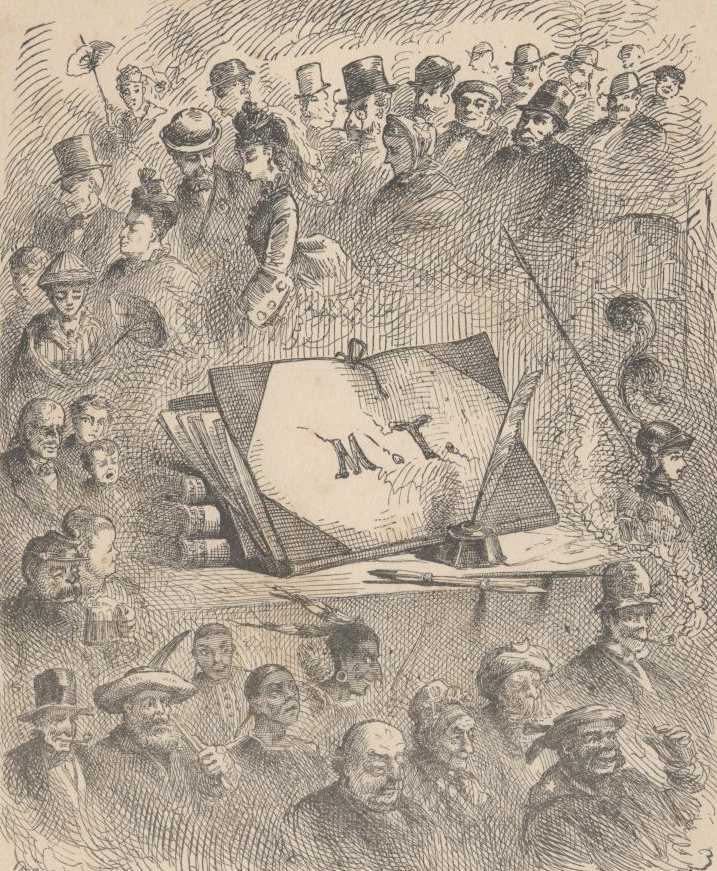

CONTENTS:
| PREFACE MY WATCH POLITICAL ECONOMY THE JUMPING FROG JOURNALISM IN TENNESSEE THE STORY OF THE BAD LITTLE BOY THE STORY OF THE GOOD LITTLE BOY A COUPLE OF POEMS BY TWAIN AND MOORE NIAGARA |
SKETCHES NEW AND OLD
Part 1.
MY WATCH
AN INSTRUCTIVE LITTLE TALE—[Written about 1870.]
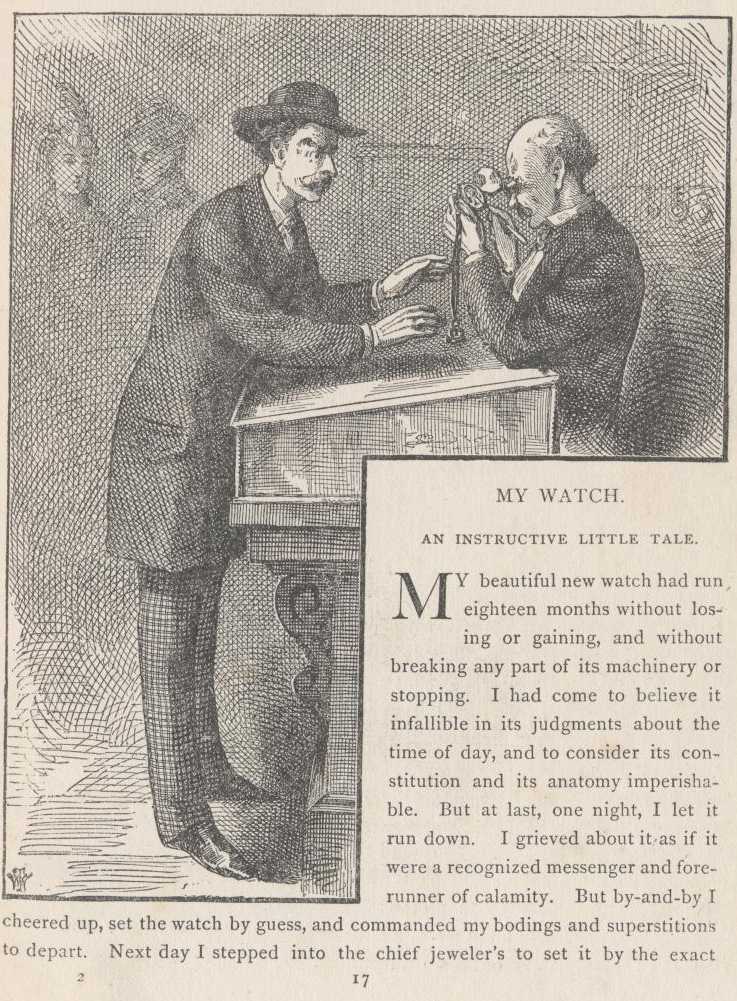
My beautiful new watch had run eighteen months without losing or gaining, and without breaking any part of its machinery or stopping. I had come to believe it infallible in its judgments about the time of day, and to consider its constitution and its anatomy imperishable. But at last, one night, I let it run down. I grieved about it as if it were a recognized messenger and forerunner of calamity. But by and by I cheered up, set the watch by guess, and commanded my bodings and superstitions to depart. Next day I stepped into the chief jeweler's to set it by the exact time, and the head of the establishment took it out of my hand and proceeded to set it for me. Then he said, "She is four minutes slow-regulator wants pushing up." I tried to stop him—tried to make him understand that the watch kept perfect time. But no; all this human cabbage could see was that the watch was four minutes slow, and the regulator must be pushed up a little; and so, while I danced around him in anguish, and implored him to let the watch alone, he calmly and cruelly did the shameful deed. My watch began to gain. It gained faster and faster day by day. Within the week it sickened to a raging fever, and its pulse went up to a hundred and fifty in the shade. At the end of two months it had left all the timepieces of the town far in the rear, and was a fraction over thirteen days ahead of the almanac. It was away into November enjoying the snow, while the October leaves were still turning. It hurried up house rent, bills payable, and such things, in such a ruinous way that I could not abide it. I took it to the watchmaker to be regulated. He asked me if I had ever had it repaired. I said no, it had never needed any repairing. He looked a look of vicious happiness and eagerly pried the watch open, and then put a small dice-box into his eye and peered into its machinery. He said it wanted cleaning and oiling, besides regulating—come in a week. After being cleaned and oiled, and regulated, my watch slowed down to that degree that it ticked like a tolling bell. I began to be left by trains,
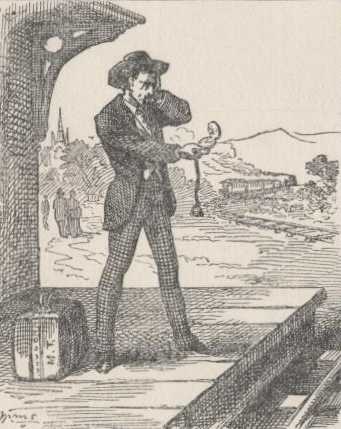
I failed all appointments, I got to missing my dinner; my watch strung out three days' grace to four and let me go to protest; I gradually drifted back into yesterday, then day before, then into last week, and by and by the comprehension came upon me that all solitary and alone I was lingering along in week before last, and the world was out of sight. I seemed to detect in myself a sort of sneaking fellow-feeling for the mummy in the museum, and a desire to swap news with him. I went to a watchmaker again. He took the watch all to pieces while I waited, and then said the barrel was "swelled." He said he could reduce it in three days. After this the watch averaged well, but nothing more. For half a day it would go like the very mischief, and keep up such a barking and wheezing and whooping and sneezing and snorting, that I could not hear myself think for the disturbance; and as long as it held out there was not a watch in the land that stood any chance against it. But the rest of the day it would keep on slowing down and fooling along until all the clocks it had left behind caught up again. So at last, at the end of twenty-four hours, it would trot up to the judges' stand all right and just in time. It would show a fair and square average, and no man could say it had done more or less than its duty. But a correct average is only a mild virtue in a watch, and I took this instrument to another watchmaker. He said the king-bolt was broken. I said I was glad it was nothing more serious. To tell the plain truth, I had no idea what the king-bolt was, but I did not choose to appear ignorant to a stranger.
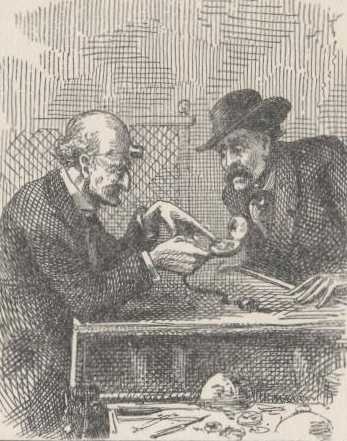
He repaired the king-bolt, but what the watch gained in one way it lost in another. It would run awhile and then stop awhile, and then run awhile again, and so on, using its own discretion about the intervals. And every time it went off it kicked back like a musket. I padded my breast for a few days, but finally took the watch to another watchmaker. He picked it all to pieces, and turned the ruin over and over under his glass; and then he said there appeared to be something the matter with the hair-trigger. He fixed it, and gave it a fresh start. It did well now, except that always at ten minutes to ten the hands would shut together like a pair of scissors, and from that time forth they would travel together. The oldest man in the world could not make head or tail of the time of day by such a watch, and so I went again to have the thing repaired. This person said that the crystal had got bent, and that the mainspring was not straight. He also remarked that part of the works needed half-soling. He made these things all right, and then my timepiece performed unexceptionably, save that now and then, after working along quietly for nearly eight hours, everything inside would let go all of a sudden and begin to buzz like a bee, and the hands would straightway begin to spin round and round so fast that their individuality was lost completely, and they simply seemed a delicate spider's web over the face of the watch. She would reel off the next twenty-four hours in six or seven minutes, and then stop with a bang. I went with a heavy heart to one more watchmaker, and looked on while he took her to pieces. Then I prepared to cross-question him rigidly, for this thing was getting serious. The watch had cost two hundred dollars originally, and I seemed to have paid out two or three thousand for repairs. While I waited and looked on I presently recognized in this watchmaker an old acquaintance—a steamboat engineer of other days, and not a good engineer, either. He examined all the parts carefully, just as the other watchmakers had done, and then delivered his verdict with the same confidence of manner.
He said:
"She makes too much steam—you want to hang the monkey-wrench on the safety-valve!"
I brained him on the spot, and had him buried at my own expense.
My uncle William (now deceased, alas!) used to say that a good horse was, a good horse until it had run away once, and that a good watch was a good watch until the repairers got a chance at it. And he used to wonder what became of all the unsuccessful tinkers, and gunsmiths, and shoemakers, and engineers, and blacksmiths; but nobody could ever tell him.
POLITICAL ECONOMY

Political Economy is the basis of all good government. The wisest men of all ages have brought to bear upon this subject the—
[Here I was interrupted and informed that a stranger wished to see me down at the door. I went and confronted him, and asked to know his business, struggling all the time to keep a tight rein on my seething political-economy ideas, and not let them break away from me or get tangled in their harness. And privately I wished the stranger was in the bottom of the canal with a cargo of wheat on top of him. I was all in a fever, but he was cool. He said he was sorry to disturb me, but as he was passing he noticed that I needed some lightning-rods. I said, "Yes, yes—go on—what about it?" He said there was nothing about it, in particular—nothing except that he would like to put them up for me. I am new to housekeeping; have been used to hotels and boarding-houses all my life. Like anybody else of similar experience, I try to appear (to strangers) to be an old housekeeper; consequently I said in an offhand way that I had been intending for some time to have six or eight lightning-rods put up, but—The stranger started, and looked inquiringly at me, but I was serene. I thought that if I chanced to make any mistakes, he would not catch me by my countenance. He said he would rather have my custom than any man's in town. I said, "All right," and started off to wrestle with my great subject again, when he called me back and said it would be necessary to know exactly how many "points" I wanted put up, what parts of the house I wanted them on, and what quality of rod I preferred. It was close quarters for a man not used to the exigencies of housekeeping; but I went through creditably, and he probably never suspected that I was a novice. I told him to put up eight "points," and put them all on the roof, and use the best quality of rod. He said he could furnish the "plain" article at 20 cents a foot; "coppered," 25 cents; "zinc-plated spiral-twist," at 30 cents, that would stop a streak of lightning any time, no matter where it was bound, and "render its errand harmless and its further progress apocryphal." I said apocryphal was no slouch of a word, emanating from the source it did, but, philology aside, I liked the spiral-twist and would take that brand. Then he said he could make two hundred and fifty feet answer; but to do it right, and make the best job in town of it, and attract the admiration of the just and the unjust alike, and compel all parties to say they never saw a more symmetrical and hypothetical display of lightning-rods since they were born, he supposed he really couldn't get along without four hundred, though he was not vindictive, and trusted he was willing to try. I said, go ahead and use four hundred, and make any kind of a job he pleased out of it, but let me get back to my work. So I got rid of him at last; and now, after half an hour spent in getting my train of political-economy thoughts coupled together again, I am ready to go on once more.]
richest treasures of their genius, their experience of life, and their learning. The great lights of commercial jurisprudence, international confraternity, and biological deviation, of all ages, all civilizations, and all nationalities, from Zoroaster down to Horace Greeley, have—
[Here I was interrupted again, and required to go down and confer further with that lightning-rod man. I hurried off, boiling and surging with prodigious thoughts wombed in words of such majesty that each one of them was in itself a straggling procession of syllables that might be fifteen minutes passing a given point, and once more I confronted him—he so calm and sweet, I so hot and frenzied. He was standing in the contemplative attitude of the Colossus of Rhodes, with one foot on my infant tuberose, and the other among my pansies, his hands on his hips, his hat-brim tilted forward, one eye shut and the other gazing critically and admiringly in the direction of my principal chimney. He said now there was a state of things to make a man glad to be alive; and added, "I leave it to you if you ever saw anything more deliriously picturesque than eight lightning-rods on one chimney?" I said I had no present recollection of anything that transcended it. He said that in his opinion nothing on earth but Niagara Falls was superior to it in the way of natural scenery. All that was needed now, he verily believed, to make my house a perfect balm to the eye, was to kind of touch up the other chimneys a little, and thus "add to the generous 'coup d'oeil' a soothing uniformity of achievement which would allay the excitement naturally consequent upon the 'coup d'etat.'" I asked him if he learned to talk out of a book, and if I could borrow it anywhere? He smiled pleasantly, and said that his manner of speaking was not taught in books, and that nothing but familiarity with lightning could enable a man to handle his conversational style with impunity. He then figured up an estimate, and said that about eight more rods scattered about my roof would about fix me right, and he guessed five hundred feet of stuff would do it; and added that the first eight had got a little the start of him, so to speak, and used up a mere trifle of material more than he had calculated on—a hundred feet or along there. I said I was in a dreadful hurry, and I wished we could get this business permanently mapped out, so that I could go on with my work. He said, "I could have put up those eight rods, and marched off about my business—some men would have done it. But no; I said to myself, this man is a stranger to me, and I will die before I'll wrong him; there ain't lightning-rods enough on that house, and for one I'll never stir out of my tracks till I've done as I would be done by, and told him so. Stranger, my duty is accomplished; if the recalcitrant and dephlogistic messenger of heaven strikes your—" "There, now, there," I said, "put on the other eight—add five hundred feet of spiral-twist—do anything and everything you want to do; but calm your sufferings, and try to keep your feelings where you can reach them with the dictionary. Meanwhile, if we understand each other now, I will go to work again."
I think I have been sitting here a full hour this time, trying to get back to where I was when my train of thought was broken up by the last interruption; but I believe I have accomplished it at last, and may venture to proceed again.]
wrestled with this great subject, and the greatest among them have found it a worthy adversary, and one that always comes up fresh and smiling after every throw. The great Confucius said that he would rather be a profound political economist than chief of police. Cicero frequently said that political economy was the grandest consummation that the human mind was capable of consuming; and even our own Greeley had said vaguely but forcibly that "Political—
[Here the lightning-rod man sent up another call for me. I went down in a state of mind bordering on impatience. He said he would rather have died than interrupt me, but when he was employed to do a job, and that job was expected to be done in a clean, workmanlike manner, and when it was finished and fatigue urged him to seek the rest and recreation he stood so much in need of, and he was about to do it, but looked up and saw at a glance that all the calculations had been a little out, and if a thunder-storm were to come up, and that house, which he felt a personal interest in, stood there with nothing on earth to protect it but sixteen lightning-rods—"Let us have peace!" I shrieked. "Put up a hundred and fifty! Put some on the kitchen! Put a dozen on the barn! Put a couple on the cow! Put one on the cook!—scatter them all over the persecuted place till it looks like a zinc-plated, spiral-twisted, silver-mounted canebrake! Move! Use up all the material you can get your hands on, and when you run out of lightning-rods put up ramrods, cam-rods, stair-rods, piston-rods—anything that will pander to your dismal appetite for artificial scenery, and bring respite to my raging brain and healing to my lacerated soul!" Wholly unmoved—further than to smile sweetly—this iron being simply turned back his wrist-bands daintily, and said he would now proceed to hump himself. Well, all that was nearly three hours ago. It is questionable whether I am calm enough yet to write on the noble theme of political economy, but I cannot resist the desire to try, for it is the one subject that is nearest to my heart and dearest to my brain of all this world's philosophy.]
economy is heaven's best boon to man." When the loose but gifted Byron lay in his Venetian exile he observed that, if it could be granted him to go back and live his misspent life over again, he would give his lucid and unintoxicated intervals to the composition, not of frivolous rhymes, but of essays upon political economy. Washington loved this exquisite science; such names as Baker, Beckwith, Judson, Smith, are imperishably linked with it; and even imperial Homer, in the ninth book of the Iliad, has said:
Fiat justitia, ruat coelum,
Post mortem unum, ante bellum,
Hic facet hoc, ex-parte res,
Politicum e-conomico est.
The grandeur of these conceptions of the old poet, together with the felicity of the wording which clothes them, and the sublimity of the imagery whereby they are illustrated, have singled out that stanza, and made it more celebrated than any that ever—
["Now, not a word out of you—not a single word. Just state your bill and relapse into impenetrable silence for ever and ever on these premises. Nine hundred, dollars? Is that all? This check for the amount will be honored at any respectable bank in America. What is that multitude of people gathered in the street for? How?—'looking at the lightning-rods!' Bless my life, did they never see any lightning-rods before? Never saw 'such a stack of them on one establishment,' did I understand you to say? I will step down and critically observe this popular ebullition of ignorance."]
THREE DAYS LATER.—We are all about worn out. For four-and-twenty hours our bristling premises were the talk and wonder of the town. The theaters languished, for their happiest scenic inventions were tame and commonplace compared with my lightning-rods. Our street was blocked night and day with spectators, and among them were many who came from the country to see. It was a blessed relief on the second day when a thunderstorm came up and the lightning began to "go for" my house, as the historian Josephus quaintly phrases it. It cleared the galleries, so to speak. In five minutes there was not a spectator within half a mile of my place; but all the high houses about that distance away were full, windows, roof, and all. And well they might be, for all the falling stars and Fourth-of-July fireworks of a generation, put together and rained down simultaneously out of heaven in one brilliant shower upon one helpless roof, would not have any advantage of the pyrotechnic display that was making my house so magnificently conspicuous in the general gloom of the storm.
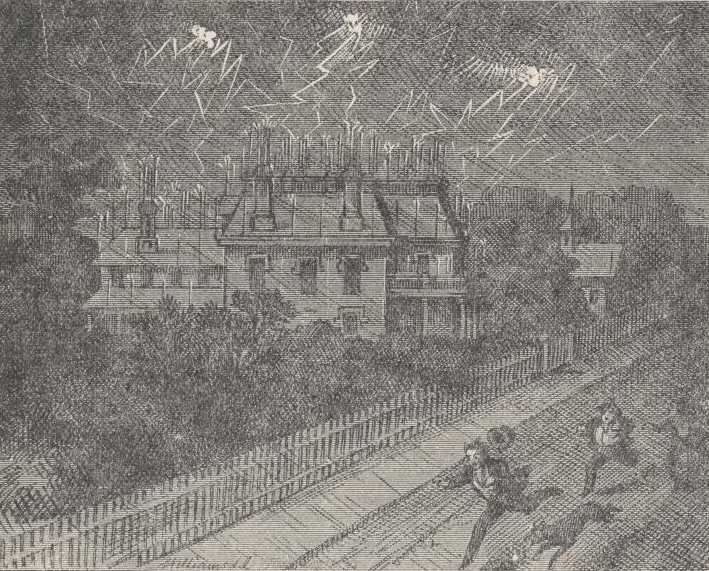
By actual count, the lightning struck at my establishment seven hundred and sixty-four times in forty minutes, but tripped on one of those faithful rods every time, and slid down the spiral-twist and shot into the earth before it probably had time to be surprised at the way the thing was done. And through all that bombardment only one patch of slates was ripped up, and that was because, for a single instant, the rods in the vicinity were transporting all the lightning they could possibly accommodate. Well, nothing was ever seen like it since the world began. For one whole day and night not a member of my family stuck his head out of the window but he got the hair snatched off it as smooth as a billiard-ball; and; if the reader will believe me, not one of us ever dreamt of stirring abroad. But at last the awful siege came to an end-because there was absolutely no more electricity left in the clouds above us within grappling distance of my insatiable rods. Then I sallied forth, and gathered daring workmen together, and not a bite or a nap did we take till the premises were utterly stripped of all their terrific armament except just three rods on the house, one on the kitchen, and one on the barn—and, behold, these remain there even unto this day. And then, and not till then, the people ventured to use our street again. I will remark here, in passing, that during that fearful time I did not continue my essay upon political economy. I am not even yet settled enough in nerve and brain to resume it.
TO WHOM IT MAY CONCERN.—Parties having need of three thousand two hundred and eleven feet of best quality zinc-plated spiral-twist lightning-rod stuff, and sixteen hundred and thirty-one silver-tipped points, all in tolerable repair (and, although much worn by use, still equal to any ordinary emergency), can hear of a bargain by addressing the publisher.
THE JUMPING FROG
[written about 1865]
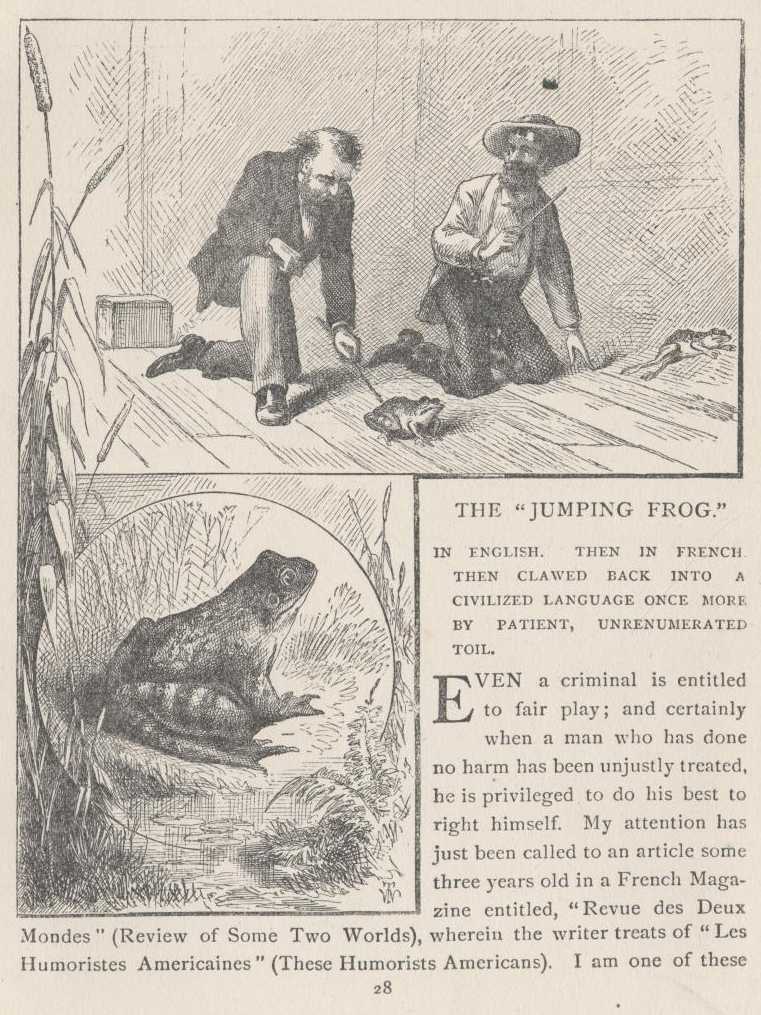
IN ENGLISH. THEN IN FRENCH. THEN CLAWED BACK INTO A CIVILIZED LANGUAGE ONCE MORE BY PATIENT, UNREMUNERATED TOIL.
Even a criminal is entitled to fair play; and certainly when a man who has done no harm has been unjustly treated, he is privileged to do his best to right himself. My attention has just beep called to an article some three years old in a French Magazine entitled, 'Revue des Deux Mondes' (Review of Some Two Worlds), wherein the writer treats of "Les Humoristes Americaines" (These Humorist Americans). I am one of these humorists American dissected by him, and hence the complaint I am making.
This gentleman's article is an able one (as articles go, in the French, where they always tangle up everything to that degree that when you start into a sentence you never know whether you are going to come out alive or not). It is a very good article and the writer says all manner of kind and complimentary things about me—for which I am sure thank him with all my heart; but then why should he go and spoil all his praise by one unlucky experiment? What I refer to is this: he says my jumping Frog is a funny story, but still he can't see why it should ever really convulse any one with laughter—and straightway proceeds to translate it into French in order to prove to his nation that there is nothing so very extravagantly funny about it. Just there is where my complaint originates. He has not translated it at all; he has simply mixed it all up; it is no more like the jumping Frog when he gets through with it than I am like a meridian of longitude. But my mere assertion is not proof; wherefore I print the French version, that all may see that I do not speak falsely; furthermore, in order that even the unlettered may know my injury and give me their compassion, I have been at infinite pains and trouble to retranslate this French version back into English; and to tell the truth I have well-nigh worn myself out at it, having scarcely rested from my work during five days and nights. I cannot speak the French language, but I can translate very well, though not fast, I being self-educated. I ask the reader to run his eye over the original English version of the jumping Frog, and then read the French or my retranslation, and kindly take notice how the Frenchman has riddled the grammar. I think it is the worst I ever saw; and yet the French are called a polished nation. If I had a boy that put sentences together as they do, I would polish him to some purpose. Without further introduction, the jumping Frog, as I originally wrote it, was as follows [after it will be found the French version—(French version is deleted from this edition)—, and after the latter my retranslation from the French]
THE NOTORIOUS JUMPING FROG OF CALAVERAS COUNTY
[Pronounced Cal-e-va-ras]
In compliance with the request of a friend of mine, who wrote me from the East, I called on good-natured, garrulous old Simon Wheeler, and inquired after my friend's friend, Leonidas W. Smiley, as requested to do, and I hereunto append the result. I have a lurking suspicion that Leonidas W. Smiley is a myth that my friend never knew such a personage; and that he on conjectured that if I asked old Wheeler about him, it would remind him of his infamous Jim Smiley, and he would go to work and bore me to death with some exasperating reminiscence him as long and as tedious as it should be useless to me. If that was the design, it succeeded.
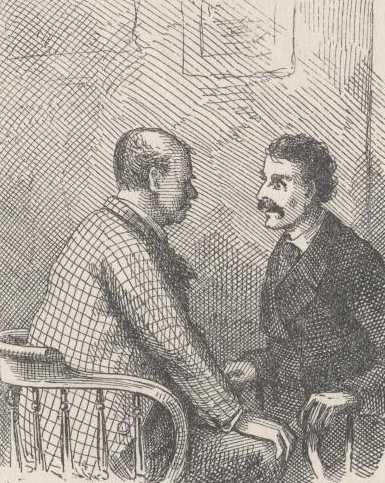
I found Simon Wheeler dozing comfortably by the bar-room stove of the dilapidated tavern in the decayed mining camp Angel's, and I noticed that he was fat and bald-headed, and had an expression of winning gentleness and simplicity upon his tranquil countenance. He roused up, and gave me good day. I told him that a friend of mine had commissioned me to make some inquiries about a cherished companion of his boyhood named Leonidas W. Smiley—Rev. Leonidas W. Smiley, a young minister of the Gospel, who he had heard was at one time resident of Angel's Camp. I added that if Mr. Wheeler could tell me anything about this Rev. Leonidas W. Smiley, I would feel under many obligations to him.
Simon Wheeler backed me into a corner and blockaded me there with his chair, and then sat down and reeled off the monotonous narrative which follows this paragraph. He never smiled he never frowned, he never changed his voice from the gentle flowing key to which he tuned his initial sentence, he never betrayed the slightest suspicion of enthusiasm; but all through the interminable narrative there ran a vein of impressive earnestness and sincerity, which showed me plainly that, so far from his imagining that there was anything ridiculous or funny about his story, he regarded it as a really important matter, and admired its two heroes as men of transcendent genius in 'finesse.' I let him go on in his own way, and never interrupted him once.
"Rev. Leonidas W. H'm, Reverend Le—well, there was a feller here, once by the name of Jim Smiley, in the winter of '49—or maybe it was the spring of '50—I don't recollect exactly, somehow, though what makes me think it was one or the other is because I remember the big flume warn't finished when he first come to the camp; but anyway, he was the curiousest man about always betting on anything that turned up you ever see, if he could get anybody to bet on the other side; and if he couldn't he'd change sides. Any way that suited the other man would suit him any way just so's he got a bet, he was satisfied. But still he was lucky, uncommon lucky; he most always come out winner. He was always ready and laying for a chance; there couldn't be no solit'ry thing mentioned but that feller'd offer to bet on it, and take any side you please, as I was just telling you.
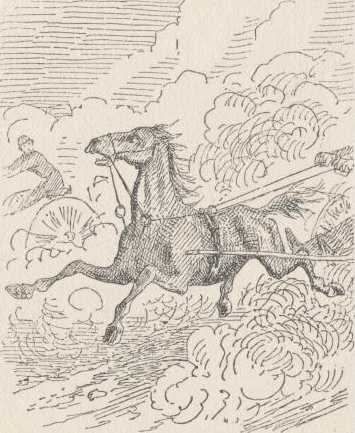
If there was a horse-race, you'd find him flush or you'd find him busted at the end of it; if there was a dog-fight, he'd bet on it; if there was a cat-fight, he'd bet on it; if there was a chicken-fight, he'd bet on it; why, if there was two birds setting on a fence, he would bet you which one would fly first; or if there was a camp-meeting, he would be there reg'lar to bet on Parson Walker, which he judged to be the best exhorter about here, and so he was too, and a good man. If he even see a straddle-bug start to go anywheres, he would bet you how long it would take him to get to—to wherever he was going to, and if you took him up, he would foller that straddle-bug to Mexico but what he would find out where he was bound for and how long he was on the road. Lots of the boys here has seen that Smiley, and can tell you about him. Why, it never made no difference to him—he'd bet on any thing—the dangdest feller. Parson Walker's wife laid very sick once, for a good while, and it seemed as if they warn't going to save her; but one morning he come in, and Smiley up and asked him how she was, and he said she was considerable better—thank the Lord for his inf'nite mercy—and coming on so smart that with the blessing of Prov'dence she'd get well yet; and Smiley, before he thought, says, 'Well, I'll resk two-and-a-half she don't anyway.'
"Thish-yer Smiley had a mare—the boys called her the fifteen-minute nag, but that was only in fun, you know, because of course she was faster than that—and he used to win money on that horse, for all she was so slow and always had the asthma, or the distemper, or the consumption, or something of that kind. They used to give her two or three hundred yards' start, and then pass her under way; but always at the fag end of the race she get excited and desperate like, and come cavorting and straddling up, and scattering her legs around limber, sometimes in the air, and sometimes out to one side among the fences, and kicking up m-o-r-e dust and raising m-o-r-e racket with her coughing and sneezing and blowing her nose—and always fetch up at the stand just about a neck ahead, as near as you could cipher it down.
"And he had a little small bull-pup, that to look at him you'd think he warn't worth a cent but to set around and look ornery and lay for a chance to steal something. But as soon as money was up on him he was a different dog; his under-jaw'd begin to stick out like the fo'castle of a steamboat, and his teeth would uncover and shine like the furnaces. And a dog might tackle him and bully-rag him, and bite him, and throw him over his shoulder two or three times, and Andrew Jackson—which was the name of the pup—Andrew Jackson would never let on but what he was satisfied, and hadn't expected nothing else—and the bets being doubled and doubled on the other side all the time, till the money was all up; and then all of a sudden he would grab that other dog jest by the j'int of his hind leg and freeze to it—not chaw, you understand, but only just grip and hang on till they throwed up the sponge, if it was a year. Smiley always come out winner on that pup, till he harnessed a dog once that didn't have no hind legs, because they'd been sawed off in a circular saw, and when the thing had gone along far enough, and the money was all up, and he come to make a snatch for his pet holt, he see in a minute how he'd been imposed on, and how the other dog had him in the door, so to speak, and he 'peared surprised, and then he looked sorter discouraged-like and didn't try no more to win the fight, and so he got shucked out bad. He give Smiley a look, as much as to say his heart was broke, and it was his fault, for putting up a dog that hadn't no hind legs for him to take holt of, which was his main dependence in a fight, and then he limped off a piece and laid down and died. It was a good pup, was that Andrew Jackson, and would have made a name for hisself if he'd lived, for the stuff was in him and he had genius—I know it, because he hadn't no opportunities to speak of, and it don't stand to reason that a dog could make such a fight as he could under them circumstances if he hadn't no talent. It always makes me feel sorry when I think of that last fight of his'n, and the way it turned out.
"Well, thish-yer Smiley had rat-tarriers, and chicken cocks, and tomcats and all them kind of things, till you couldn't rest, and you couldn't fetch nothing for him to bet on but he'd match you. He ketched a frog one day, and took him home, and said he cal'lated to educate him; and so he never done nothing for three months but set in his back yard and learn that frog to jump. And you bet you he did learn him, too. He'd give him a little punch behind, and the next minute you'd see that frog whirling in the air like a doughnut—see him turn one summerset, or maybe a couple, if he got a good start, and come down flat-footed and all right, like a cat. He got him up so in the matter of ketching flies, and kep' him in practice so constant, that he'd nail a fly every time as fur as he could see him. Smiley said all a frog wanted was education, and he could do 'most anything—and I believe him. Why, I've seen him set Dan'l Webster down here on this floor—Dan'l Webster was the name of the frog—and sing out, 'Flies, Dan'l, flies!' and quicker'n you could wink he'd spring straight up and snake a fly off'n the counter there, and flop down on the floor ag'in as solid as a gob of mud, and fall to scratching the side of his head with his hind foot as indifferent as if he hadn't no idea he'd been doin' any more'n any frog might do. You never see a frog so modest and straightfor'ard as he was, for all he was so gifted. And when it come to fair and square jumping on a dead level, he could get over more ground at one straddle than any animal of his breed you ever see. Jumping on a dead level was his strong suit, you understand; and when it come to that, Smiley would ante up money on him as long as he had a red. Smiley was monstrous proud of his frog, and well he might be, for fellers that had traveled and been everywheres all said he laid over any frog that ever they see.
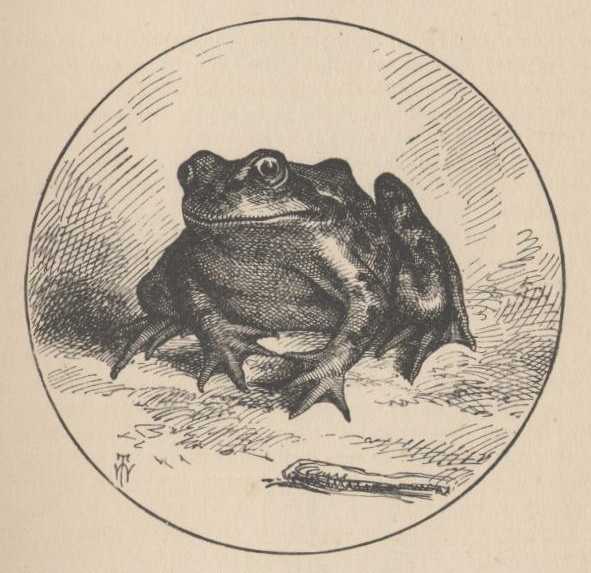
"Well, Smiley kep' the beast in a little lattice box, and he used to fetch him down-town sometimes and lay for a bet. One day a feller—a stranger in the camp, he was—come acrost him with his box, and says:
"'What might it be that you've got in the box?'
"And Smiley says, sorter indifferent-like, 'It might be a parrot, or it might be a canary, maybe, but it ain't—it's only just a frog.'
"And the feller took it, and looked at it careful, and turned it round this way and that, and says, 'H'm—so 'tis. Well, what's HE good for.
"'Well,' Smiley says, easy and careless, 'he's good enough for one thing, I should judge—he can outjump any frog in Calaveras County.
"The feller took the box again, and took another long, particular look, and give it back to Smiley, and says, very deliberate, 'Well,' he says, 'I don't see no pints about that frog that's any better'n any other frog.'
"'Maybe you don't,' Smiley says. 'Maybe you understand frogs and maybe you don't understand 'em; maybe you've had experience, and maybe you ain't only a amature, as it were. Anyways, I've got my opinion, and I'll resk forty dollars the he can outjump any frog in Calaveras County.'
"And the feller studied a minute, and then says, kinder sad-like, 'Well, I'm only a, stranger here, and I ain't got no frog; but if I had a frog, I'd bet you.
"And then Smiley says, 'That's all right—that's all right if you'll hold my box a minute, I'll go and get you a frog.' Any so the feller took the box, and put up his forty dollars along with Smiley's, and set down to wait.
"So he set there a good while thinking and thinking to himself and then he got the frog out and prized his mouth open and took a teaspoon and filled him full of quail-shot-filled him pretty near up to his chin—and set him on the floor. Smiley he went to the swamp and slopped around in the mud for a long time, and finally he ketched a frog, and fetched him in, and give him to this feller and says:
"'Now, if you're ready, set him alongside of Dan'l, with his fore paws just even with Dan'l's, and I'll give the word.' Then he says, 'One-two-three—git' and him and the feller touches up the frogs from behind, and the new frog hopped off lively but Dan'l give a heave, and hysted up his shoulders—-so-like a Frenchman, but it warn't no use—he couldn't budge; he was planted as solid as a church, and he couldn't no more stir than if he was anchored out. Smiley was a good deal surprised, and he was disgusted too, but he didn't have no idea what the matter was of course.
"The Teller took the money and started away; and when he was going out at the door, he sorter jerked his thumb over his shoulder—so—at Dan'l, and says again, very deliberate, 'Well,' he says, 'I don't see no pints about that frog that's any better'n any other frog.'
"Smiley he stood scratching his head and looking down at Dan'l a long time, and at last he says, 'I do wonder what in the nation that frog throw'd off for—I wonder if there ain't something the matter with him—he 'pears to look mighty baggy, somehow.' And he ketched Dan'l by the nap of the neck, and hefted him, and says, 'Why blame my cats if he don't weigh five pound!' and turned him upside down and he belched out a double handful of shot. And then he see how it was, and he was the maddest man—he set the frog down and took out after that feller, but he never ketched him. And—"
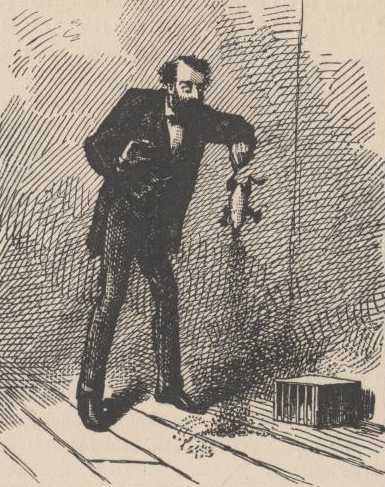
[Here Simon Wheeler heard his name called from the front yard, and got up to see what was wanted.] And turning to me as he moved away, he said: "Just set where you are, stranger, and rest easy—I ain't going to be gone a second."
But, by your leave, I did not think that a continuation of the history of the enterprising vagabond Jim Smiley would be likely to afford me much information concerning the Rev. Leonidas W. Smiley, and so I started away.
At the door I met the sociable Wheeler returning, and he buttonholed me and recommenced:
"Well, thish-yer Smiley had a yaller one-eyed cow that didn't have no tail, only just a short stump like a bannanner, and—"
However, lacking both time and inclination, I did not wait to hear about the afflicted cow, but took my leave.
Now let the learned look upon this picture and say if iconoclasm can further go:
[From the Revue des Deux Mondes, of July 15th, 1872.]
.......................
THE JUMPING FROG
"—Il y avait, une fois ici un individu connu sous le nom de Jim Smiley: c'etait dans l'hiver de 49, peut-etre bien au printemps de 50, je ne me reappelle pas exactement. Ce qui me fait croire que c'etait l'un ou l'autre, c'est que je me souviens que le grand bief n'etait pas acheve lorsqu'il arriva au camp pour la premiere fois, mais de toutes facons il etait l'homme le plus friand de paris qui se put voir, pariant sur tout ce qui se presentaat, quand il pouvait trouver un adversaire, et, quand n'en trouvait pas il passait du cote oppose. Tout ce qui convenaiat l'autre lui convenait; pourvu qu'il eut un pari, Smiley etait satisfait. Et il avait une chance! une chance inouie: presque toujours il gagnait. It faut dire qu'il etait toujours pret a'exposer, qu'on ne pouvait mentionner la moindre chose sans que ce gaillard offrit de parier la-dessus n'importe quoi et de prendre le cote que l'on voudrait, comme je vous le disais tout a l'heure. S'il y avait des courses, vous le trouviez riche ou ruine a la fin; s'il y avait un combat de chiens, il apportait son enjeu; il l'apportait pour un combat de chats, pour un combat de coqs;—parbleu! si vous aviez vu deux oiseaux sur une haie il vous aurait offert de parier lequel s'envolerait le premier, et s'il y aviat 'meeting' au camp, il venait parier regulierement pour le cure Walker, qu'il jugeait etre le meilleur predicateur des environs, et qui l'etait en effet, et un brave homme. Il aurai rencontre une punaise de bois en chemin, qu'il aurait parie sur le temps qu'il lui faudrait pour aller ou elle voudrait aller, et si vous l'aviez pris au mot, it aurait suivi la punaise jusqu'au Mexique, sans se soucier d'aller si loin, ni du temps qu'il y perdrait. Une fois la femme du cure Walker fut tres malade pendant longtemps, il semblait qu'on ne la sauverait pas; mai un matin le cure arrive, et Smiley lui demande comment ella va et il dit qu'elle est bien mieux, grace a l'infinie misericorde tellement mieux qu'avec la benediction de la Providence elle s'en tirerait, et voila que, sans y penser, Smiley repond:—Eh bien! ye gage deux et demi qu'elle mourra tout de meme.
"Ce Smiley avait une jument que les gars appelaient le bidet du quart d'heure, mais seulement pour plaisanter, vous comprenez, parse que, bien entendu, elle etait plus vite que ca! Et il avait coutume de gagner de l'argent avec cette bete, quoi-qu'elle fut poussive, cornarde, toujours prise d'asthme, de colique ou de consomption, ou de quelque chose d'approchant. On lui donnait 2 ou 300 'yards' au depart, puffs on la depassait sans peine; mais jamais a la fin elle ne manquait de s'echauffer, de s'exasperer et elle arrivait, s'ecartant, se defendant, ses jambes greles en l'ai devant les obstacles, quelquefois les evitant et faisant avec cela plus de poussiare qu'aucun cheval, plus de bruit surtout avec ses eternumens et reniflemens.—-crac! elle arrivaat donc toujour premiere d'une tete, aussi juste qu'on peut le mesurer. Et il avait un petit bouledogue qui, a le voir, ne valait pas un sou; on aurait cru que parier contre lui c'etait voler, tant il etait ordinaire; mais aussitot les enjeux faits, il devenait un autre chien. Sa machoire inferieure commencait a ressortir comme un gaillard d'avant, ses dents se decouvcraient brillantes commes des fournaises, et un chien pouvait le taquiner, l'exciter, le mordre, le jeter deux ou trois fois par-dessus son epaule, Andre Jackson, c'etait le nom du chien, Andre Jackson prenait cela tranquillement, comme s'il ne se fut jamais attendu a autre chose, et quand les paris etaient doubles et redoubles contre lui, il vous saisissait l'autre chien juste a l'articulation de la jambe de derriere, et il ne la lachait plus, non pas qu'il la machat, vous concevez, mais il s'y serait tenu pendu jusqu'a ce qu'on jetat l'eponge en l'air, fallut-il attendre un an. Smiley gagnait toujours avec cette bete-la; malheureusement ils ont fini par dresser un chien qui n'avait pas de pattes de derriere, parce qu'on les avait sciees, et quand les choses furent au point qu'il voulait, et qu'il en vint a se jeter sur son morceau favori, le pauvre chien comprit en un instant qu'on s'etait moque de lui, et que l'autre le tenait. Vous n'avez jamais vu personne avoir l'air plus penaud et plus decourage; il ne fit aucun effort pour gagner le combat et fut rudement secoue, de sorte que, regardant Smiley comme pour lui dire:—Mon coeur est brise, c'est to faute; pourquoi m'avoir livre a un chien qui n'a pas de pattes de derriere, puisque c'est par la que je les bats?—il s'en alla en clopinant, et se coucha pour mourir. Ah! c'etait un bon chien, cet Andre Jackson, et il se serait fait un nom, s'il avait vecu, car il y avait de l'etoffe en lui, il avait du genie, je la sais, bien que de grandes occasions lui aient manque; mais il est impossible de supposer qu'un chien capable de se battre comme lui, certaines circonstances etant donnees, ait manque de talent. Je me sens triste toutes les fois que je pense a son dernier combat et au denoument qu'il a eu. Eh bien! ce Smiley nourrissait des terriers a rats, et des coqs combat, et des chats, et toute sorte de choses, au point qu'il etait toujours en mesure de vous tenir tete, et qu'avec sa rage de paris on n'avait plus de repos. Il attrapa un jour une grenouille et l'emporta chez lui, disant qu'il pretendait faire son Education; vous me croirez si vous voulez, mais pendant trois mois il n'a rien fait que lui apprendre a sauter dans une cour retire de sa maison. Et je vous reponds qu'il avait reussi. Il lui donnait un petit coup par derriere, et l'instant d'apres vous voyiez la grenouille tourner en l'air comme un beignet au-dessus de la poele, faire une culbute, quelquefois deux, lorsqu'elle etait bien partie, et retomber sur ses pattes comme un chat. Il l'avait dressee dans l'art de gober des mouches, er l'y exercait continuellement, si bien qu'une mouche, du plus loin qu'elle apparaissait, etait une mouche perdue. Smiley avait coutume de dire que tout ce qui manquait a une grenouille, c'etait l'education, qu'avec l'education elle pouvait faire presque tout, et je le crois. Tenez, je l'ai vu poser Daniel Webster la sur se plancher,—Daniel Webster etait le nom de la grenouille,—et lui chanter: Des mouches! Daniel, des mouches!—En un clin d'oeil, Daniel avait bondi et saisi une mouche ici sur le comptoir, puis saute de nouveau par terre, ou il restait vraiment a se gratter la tete avec sa patte de derriere, comme s'il n'avait pas eu la moindre idee de sa superiorite. Jamais vous n'avez grenouille vu de aussi modeste, aussi naturelle, douee comme elle l'etait! Et quand il s'agissait de sauter purement et simplement sur terrain plat, elle faisait plus de chemin en un saut qu'aucune bete de son espece que vous puissiez connaitre. Sauter a plat, c'etait son fort! Quand il s'agissait de cela, Smiley en tassait les enjeux sur elle tant qu'il lui, restait un rouge liard. Il faut le reconnaitre, Smiley etait monstrueusement fier de sa grenouille, et il en avait le droit, car des gens qui avaient voyage, qui avaient tout vu, disaient qu'on lui ferait injure de la comparer a une autre; de facon que Smiley gardait Daniel dans une petite boite a claire-voie qu'il emportait parfois a la Ville pour quelque pari.
"Un jour, un individu etranger au camp l'arrete aver sa boite et lui dit:—Qu'est-ce que vous avez donc serre la dedans?
"Smiley dit d'un air indifferent:—Cela pourrait etre un perroquet ou un serin, mais ce n'est rien de pareil, ce n'est qu'une grenouille.
"L'individu la prend, la regarde avec soin, la tourne d'un cote et de l'autre puis il dit.—Tiens! en effet! A quoi estelle bonne?
"—Mon Dieu! repond Smiley, toujours d'un air degage, elle est bonne pour une chose a mon avis, elle peut battre en sautant toute grenouille du comte de Calaveras.
"L'individu reprend la boite, l'examine de nouveau longuement, et la rend a Smiley en disant d'un air delibere:—Eh bien! je ne vois pas que cette grenouille ait rien de mieux qu'aucune grenouille.
"—Possible qua vous ne le voyiez pat, dit Smiley, possible que vous vous entendiez en grenouilles, possible que vous ne vous y entendez point, possible qua vous avez de l'experience, et possible que vous ne soyez qu'un amateur. De toute maniere, je parie quarante dollars qu'elle battra en sautant n'importe quelle grenouille du comte de Calaveras.
"L'individu reflechit one seconde et dit comma attriste:—Je ne suis qu'un etranger ici, je n'ai pas de grenouille; mais, si j'en avais une, je tiendrais le pari. "—Fort bien! repond Smiley. Rien de plus facile. Si vous voulez tenir ma boite one minute, j'irai vous chercher une grenouille.—Voile donc l'individu qui garde la boite, qui met ses quarante dollars sur ceux de Smiley et qui attend. Il attend assez longtemps, reflechissant tout seul, et figurez-vous qu'il prend Daniel, lui ouvre la bouche de force at avec une cuiller a the l'emplit de menu plomb de chasse, mail l'emplit jusqu'au menton, puis il le pose par terre. Smiley pendant ce temps etait a barboter dans une mare. Finalement il attrape une grenouille, l'apporte cet individu et dit:—Maintenant, si vous etes pret, mettez-la tout contra Daniel, avec leurs pattes de devant sur la meme ligne, et je donnerai le signal; puis il ajoute:—Un, deux, trois, sautez! "Lui et l'individu touchent leurs grenouilles par derriere, et la grenouille neuve se met h sautiller, mais Daniel se souleve lourdement, hausse les epaules ainsi, comma un Francais; a quoi bon? il ne pouvait bouger, il etait plante solide comma une enclume, il n'avancait pas plus que si on l'eut mis a l'ancre. Smiley fut surpris et degoute, mais il ne se doutait pas du tour, bien entendu. L'individu empoche l'argent, s'en va, et en s'en allant est-ce qu'il ne donna pas un coup de pouce par-dessus l'epaule, comma ca, au pauvre Daniel, en disant de son air delibere:—Eh bien! je ne vois pas qua cette grenouille ait rien de muiex qu'une autre. "Smiley se gratta longtemps la tete, les yeux fixes Sur Daniel; jusqu'a ce qu'enfin il dit:—je me demande comment diable il se fait qua cette bite ait refuse, . . . Est-ce qu'elle aurait quelque chose? . . . On croirait qu'elle est enflee. "Il empoigne Daniel par la peau du coo, le souleve et dit:—Le loup me croque, s'il ne pese pas cinq livres. "Il le retourne, et le malheureux crache deux poignees de plomb. Quand Smiley reconnut ce qui en etait, il fut comme fou. Vous le voyez d'ici poser sa grenouille par terra et courir apres cet individu, mais il ne le rattrapa jamais, et ...."
[Translation of the above back from the French:]
THE FROG JUMPING OF THE COUNTY OF CALAVERAS
It there was one time here an individual known under the name of Jim Smiley; it was in the winter of '89, possibly well at the spring of '50, I no me recollect not exactly. This which me makes to believe that it was the one or the other, it is that I shall remember that the grand flume is not achieved when he arrives at the camp for the first time, but of all sides he was the man the most fond of to bet which one have seen, betting upon all that which is presented, when he could find an adversary; and when he not of it could not, he passed to the side opposed. All that which convenienced to the other to him convenienced also; seeing that he had a bet Smiley was satisfied. And he had a chance! a chance even worthless; nearly always he gained. It must to say that he was always near to himself expose, but one no could mention the least thing without that this gaillard offered to bet the bottom, no matter what, and to take the side that one him would, as I you it said all at the hour (tout a l'heure). If it there was of races, you him find rich or ruined at the end; if it, here is a combat of dogs, he bring his bet; he himself laid always for a combat of cats, for a combat of cocks-by-blue! If you have see two birds upon a fence, he you should have offered of to bet which of those birds shall fly the first; and if there is meeting at the camp (meeting au camp) he comes to bet regularly for the cure Walker, which he judged to be the best predicator of the neighborhood (predicateur des environs) and which he was in effect, and a brave man. He would encounter a bug of wood in the road, whom he will bet upon the time which he shall take to go where she would go—and if you him have take at the word, he will follow the bug as far as Mexique, without himself caring to go so far; neither of the time which he there lost. One time the woman of the cure Walker is very sick during long time, it seemed that one not her saved not; but one morning the cure arrives, and Smiley him demanded how she goes, and he said that she is well better, grace to the infinite misery (lui demande comment elle va, et il dit qu'elle est bien mieux, grace a l'infinie misericorde) so much better that with the benediction of the Providence she herself of it would pull out (elle s'en tirerait); and behold that without there thinking Smiley responds: "Well, I gage two-and-half that she will die all of same."
This Smiley had an animal which the boys called the nag of the quarter of hour, but solely for pleasantry, you comprehend, because, well understand, she was more fast as that! [Now why that exclamation?—M. T.] And it was custom of to gain of the silver with this beast, notwithstanding she was poussive, cornarde, always taken of asthma, of colics or of consumption, or something of approaching. One him would give two or three hundred yards at the departure, then one him passed without pain; but never at the last she not fail of herself echauffer, of herself exasperate, and she arrives herself ecartant, se defendant, her legs greles in the air before the obstacles, sometimes them elevating and making with this more of dust than any horse, more of noise above with his eternumens and reniflemens—crac! she arrives then always first by one head, as just as one can it measure. And he had a small bulldog (bouledogue!) who, to him see, no value, not a cent; one would believe that to bet against him it was to steal, so much he was ordinary; but as soon as the game made, she becomes another dog. Her jaw inferior commence to project like a deck of before, his teeth themselves discover brilliant like some furnaces, and a dog could him tackle (le taquiner), him excite, him murder (le mordre), him throw two or three times over his shoulder, Andre Jackson—this was the name of the dog—Andre Jackson takes that tranquilly, as if he not himself was never expecting other thing, and when the bets were doubled and redoubled against him, he you seize the other dog just at the articulation of the leg of behind, and he not it leave more, not that he it masticate, you conceive, but he himself there shall be holding during until that one throws the sponge in the air, must he wait a year. Smiley gained always with this beast-la; unhappily they have finished by elevating a dog who no had not of feet of behind, because one them had sawed; and when things were at the point that he would, and that he came to himself throw upon his morsel favorite, the poor dog comprehended in an instant that he himself was deceived in him, and that the other dog him had. You no have never seen person having the air more penaud and more discouraged; he not made no effort to gain the combat, and was rudely shucked.
Eh bien! this Smiley nourished some terriers a rats, and some cocks of combat, and some pats, and all sorts of things; and with his rage of betting one no had more of repose. He trapped one day a frog and him imported with him (et l'emporta chez lui) saying that he pretended to make his education. You me believe if you will, but during three months he not has nothing done but to him apprehend to jump (apprendre a sauter) in a court retired of her mansion (de sa maison). And I you respond that he have succeeded. He him gives a small blow by behind, and the instant after you shall see the frog turn in the air like a grease-biscuit, make one summersault, sometimes two, when she was well started, and refall upon his feet like a cat. He him had accomplished in the art of to gobble the flies (gober des mouches), and him there exercised continually—so well that a fly at the most far that she appeared was a fly lost. Smiley had custom to say that all which lacked to a frog it was the education, but with the education she could do nearly all—and I him believe. Tenez, I him have seen pose Daniel Webster there upon this plank—Daniel Webster was the name of the frog—and to him sing, "Some flies, Daniel, some fifes!"—in a flash of the eye Daniel 30 had bounded and seized a fly here upon the counter, then jumped anew at the earth, where he rested truly to himself scratch the head with his behind foot, as if he no had not the least idea of his superiority. Never you not have seen frog as modest, as natural, sweet as she was. And when he himself agitated to jump purely and simply upon plain earth, she does more ground in one jump than any beast of his species than you can know. To jump plain-this was his strong. When he himself agitated for that, Smiley multiplied the bets upon her as long as there to him remained a red. It must to know, Smiley was monstrously proud of his frog, and he of it was right, for some men who were traveled, who had all seen, said that they to him would be injurious to him compare, to another frog. Smiley guarded Daniel in a little box latticed which he carried bytimes to the village for some bet.
One day an individual stranger at the camp him arrested with his box and him said:
"What is this that you have them shut up there within?"
Smiley said, with an air indifferent:
"That could be a paroquet, or a syringe (ou un serin), but this no is nothing of such, it not is but a frog."
The individual it took, it regarded with care, it turned from one side and from the other, then he said:
"Tiens! in effect!—At what is she good?"
"My God!" respond Smiley, always with an air disengaged, "she is good for one thing, to my notice (A mon avis), she can better in jumping (elle pent battre en sautant) all frogs of the county of Calaveras."
The individual retook the box, it examined of new longly, and it rendered to Smiley in saying with an air deliberate:
"Eh bien! I no saw not that that frog had nothing of better than each frog." (Je ne vois pas que cette grenouille ait rien de mieux qu'aucune grenouille.) [If that isn't grammar gone to seed, then I count myself no judge.—M. T.]
"Possible that you not it saw not," said Smiley, "possible that you—you comprehend frogs; possible that you not you there comprehend nothing; possible that you had of the experience, and possible that you not be but an amateur. Of all manner (De toute maniere) I bet forty dollars that she better in jumping no matter which frog of the county of Calaveras."
The individual reflected a second, and said like sad:
"I not am but a stranger here, I no have not a frog; but if I of it had one, I would embrace the bet."
"Strong well!" respond Smiley; "nothing of more facility. If you will hold my box a minute, I go you to search a frog (j'irai vous chercher)."
Behold, then, the individual, who guards the box, who puts his forty dollars upon those of Smiley, and who attends (et qui attend). He attended enough long times, reflecting all solely. And figure you that he takes Daniel, him opens the mouth by force and with a teaspoon him fills with shot of the hunt, even him fills just to the chin, then he him puts by the earth. Smiley during these times was at slopping in a swamp. Finally he trapped (attrape) a frog, him carried to that individual, and said:
"Now if you be ready, put him all against Daniel with their before feet upon the same line, and I give the signal"—then he added: "One, two, three—advance!"
Him and the individual touched their frogs by behind, and the frog new put to jump smartly, but Daniel himself lifted ponderously, exalted the shoulders thus, like a Frenchman—to what good? he not could budge, he is planted solid like a church he not advance no more than if one him had put at the anchor.
Smiley was surprised and disgusted, but he no himself doubted not of the turn being intended (mais il ne se doutait pas du tour, bien entendu). The individual empocketed the silver, himself with it went, and of it himself in going is it that he no gives not a jerk of thumb over the shoulder—like that—at the poor Daniel, in saying with his air deliberate—(L'individu empoche l'argent, s'en va et en s'en allant est-ce qu'il ne donne pas un coup d pouce par-dessus l'epaule, comme ga, au pauvre Daniel, en disant de son air delibere):
"Eh bien! I no see not that that frog has nothin of better than another."
Smiley himself scratched longtimes the head, the eyes fixed upon Daniel, until that which at last he said:
"I me demand how the devil it makes itself that this beast has refused. Is it that she had something? One would believe that she is stuffed."
He grasped Daniel by the skin of the neck, him lifted and said:
"The wolf me bite if he no weigh not five pounds:"
He him reversed and the unhappy belched two handfuls of shot (et le malheureux, etc.). When Smiley recognized how it was, he was like mad. He deposited his frog by the earth and ran after that individual, but he not him caught never.
Such is the jumping Frog, to the distorted French eye. I claim that I never put together such an odious mixture of bad grammar and delirium tremens in my life. And what has a poor foreigner like me done, to be abused and misrepresented like this? When I say, "Well, I don't see no pints about that frog that's any better'n any other frog," is it kind, is it just, for this Frenchman to try to make it appear that I said, "Eh bien! I no saw not that that frog had nothing of better than each frog"? I have no heart to write more. I never felt so about anything before.
HARTFORD, March, 1875
JOURNALISM IN TENNESSEE
[written about 1871]

The editor of the Memphis Avalanche swoops thus mildly down upon a correspondent who posted him as a Radical:—"While he was writing the first word, the middle, dotting his i's, crossing his t's, and punching his period, he knew he was concocting a sentence that was saturated with infamy and reeking with falsehood."—Exchange.
I was told by the physician that a Southern climate would improve my health, and so I went down to Tennessee, and got a berth on the Morning Glory and Johnson County War-Whoop as associate editor. When I went on duty I found the chief editor sitting tilted back in a three-legged chair with his feet on a pine table. There was another pine table in the room and another afflicted chair, and both were half buried under newspapers and scraps and sheets of manuscript. There was a wooden box of sand, sprinkled with cigar stubs and "old soldiers," and a stove with a door hanging by its upper hinge. The chief editor had a long-tailed black cloth frock-coat on, and white linen pants. His boots were small and neatly blacked. He wore a ruffled shirt, a large seal-ring, a standing collar of obsolete pattern, and a checkered neckerchief with the ends hanging down. Date of costume about 1848. He was smoking a cigar, and trying to think of a word, and in pawing his hair he had rumpled his locks a good deal. He was scowling fearfully, and I judged that he was concocting a particularly knotty editorial. He told me to take the exchanges and skim through them and write up the "Spirit of the Tennessee Press," condensing into the article all of their contents that seemed of interest.
I wrote as follows:
SPIRIT OF THE TENNESSEE PRESS
The editors of the Semi-Weekly Earthquake evidently labor under a misapprehension with regard to the Dallyhack railroad. It is not the object of the company to leave Buzzardville off to one side. On the contrary, they consider it one of the most important points along the line, and consequently can have no desire to slight it. The gentlemen of the Earthquake will, of course, take pleasure in making the correction.
John W. Blossom, Esq., the able editor of the Higginsville Thunderbolt and Battle Cry of Freedom, arrived in the city yesterday. He is stopping at the Van Buren House.
We observe that our contemporary of the Mud Springs Morning Howl has fallen into the error of supposing that the election of Van Werter is not an established fact, but he will have discovered his mistake before this reminder reaches him, no doubt. He was doubtless misled by incomplete election returns.
It is pleasant to note that the city of Blathersville is endeavoring to contract with some New York gentlemen to pave its well-nigh impassable streets with the Nicholson pavement. The Daily Hurrah urges the measure with ability, and seems confident of ultimate success.
I passed my manuscript over to the chief editor for acceptance, alteration, or destruction. He glanced at it and his face clouded. He ran his eye down the pages, and his countenance grew portentous. It was easy to see that something was wrong. Presently he sprang up and said:
"Thunder and lightning! Do you suppose I am going to speak of those cattle that way? Do you suppose my subscribers are going to stand such gruel as that? Give me the pen!"
I never saw a pen scrape and scratch its way so viciously, or plow through another man's verbs and adjectives so relentlessly. While he was in the midst of his work, somebody shot at him through the open window, and marred the symmetry of my ear.
"Ah," said he, "that is that scoundrel Smith, of the Moral Volcano—he was due yesterday." And he snatched a navy revolver from his belt and fired—Smith dropped, shot in the thigh. The shot spoiled Smith's aim, who was just taking a second chance and he crippled a stranger. It was me. Merely a finger shot off.
Then the chief editor went on with his erasure; and interlineations. Just as he finished them a hand grenade came down the stove-pipe, and the explosion shivered the stove into a thousand fragments. However, it did no further damage, except that a vagrant piece knocked a couple of my teeth out.
"That stove is utterly ruined," said the chief editor.
I said I believed it was.
"Well, no matter—don't want it this kind of weather. I know the man that did it. I'll get him. Now, here is the way this stuff ought to be written."
I took the manuscript. It was scarred with erasures and interlineations till its mother wouldn't have known it if it had had one. It now read as follows:
SPIRIT OF THE TENNESSEE PRESS
The inveterate liars of the Semi-Weekly Earthquake are evidently endeavoring to palm off upon a noble and chivalrous people another of their vile and brutal falsehoods with regard to that most glorious conception of the nineteenth century, the Ballyhack railroad. The idea that Buzzardville was to be left off at one side originated in their own fulsome brains—or rather in the settlings which they regard as brains. They had better, swallow this lie if they want to save their abandoned reptile carcasses the cowhiding they so richly deserve.
That ass, Blossom, of the Higginsville Thunderbolt and Battle Cry of Freedom, is down here again sponging at the Van Buren.
We observe that the besotted blackguard of the Mud Springs Morning Howl is giving out, with his usual propensity for lying, that Van Werter is not elected. The heaven-born mission of journalism is to disseminate truth; to eradicate error; to educate, refine, and elevate the tone of public morals and manners, and make all men more gentle, more virtuous, more charitable, and in all ways better, and holier, and happier; and yet this blackhearted scoundrel degrades his great office persistently to the dissemination of falsehood, calumny, vituperation, and vulgarity.
Blathersville wants a Nicholson pavement—it wants a jail and a poorhouse more. The idea of a pavement in a one-horse town composed of two gin-mills, a blacksmith shop, and that mustard-plaster of a newspaper, the Daily Hurrah! The crawling insect, Buckner, who edits the Hurrah, is braying about his business with his customary imbecility, and imagining that he is talking sense.
"Now that is the way to write—peppery and to the point. Mush-and-milk journalism gives me the fan-tods."
About this time a brick came through the window with a splintering crash, and gave me a considerable of a jolt in the back. I moved out of range—I began to feel in the way.
The chief said, "That was the Colonel, likely. I've been expecting him for two days. He will be up now right away."
He was correct. The Colonel appeared in the door a moment afterward with a dragoon revolver in his hand.
He said, "Sir, have I the honor of addressing the poltroon who edits this mangy sheet?"
"You have. Be seated, sir. Be careful of the chair, one of its legs is gone. I believe I have the honor of addressing the putrid liar, Colonel Blatherskite Tecumseh?"
"Right, Sir. I have a little account to settle with you. If you are at leisure we will begin."
"I have an article on the 'Encouraging Progress of Moral and Intellectual Development in America' to finish, but there is no hurry. Begin."
Both pistols rang out their fierce clamor at the same instant. The chief lost a lock of his hair, and the Colonel's bullet ended its career in the fleshy part of my thigh. The Colonel's left shoulder was clipped a little. They fired again. Both missed their men this time, but I got my share, a shot in the arm. At the third fire both gentlemen were wounded slightly, and I had a knuckle chipped. I then said, I believed I would go out and take a walk, as this was a private matter, and I had a delicacy about participating in it further. But both gentlemen begged me to keep my seat, and assured me that I was not in the way.
They then talked about the elections and the crops while they reloaded, and I fell to tying up my wounds. But presently they opened fire again with animation, and every shot took effect—but it is proper to remark that five out of the six fell to my share. The sixth one mortally wounded the Colonel, who remarked, with fine humor, that he would have to say good morning now, as he had business uptown. He then inquired the way to the undertaker's and left.
The chief turned to me and said, "I am expecting company to dinner, and shall have to get ready. It will be a favor to me if you will read proof and attend to the customers."
I winced a little at the idea of attending to the customers, but I was too bewildered by the fusillade that was still ringing in my ears to think of anything to say.
He continued, "Jones will be here at three—cowhide him. Gillespie will call earlier, perhaps—throw him out of the window. Ferguson will be along about four—kill him. That is all for today, I believe. If you have any odd time, you may write a blistering article on the police—give the chief inspector rats. The cowhides are under the table; weapons in the drawer—ammunition there in the corner—lint and bandages up there in the pigeonholes. In case of accident, go to Lancet, the surgeon, downstairs. He advertises—we take it out in trade."
He was gone. I shuddered. At the end of the next three hours I had been through perils so awful that all peace of mind and all cheerfulness were gone from me. Gillespie had called and thrown me out of the window. Jones arrived promptly, and when I got ready to do the cowhiding he took the job off my hands. In an encounter with a stranger, not in the bill of fare, I had lost my scalp. Another stranger, by the name of Thompson, left me a mere wreck and ruin of chaotic rags. And at last, at bay in the corner, and beset by an infuriated mob of editors, blacklegs, politicians, and desperadoes, who raved and swore and flourished their weapons about my head till the air shimmered with glancing flashes of steel, I was in the act of resigning my berth on the paper when the chief arrived, and with him a rabble of charmed and enthusiastic friends. Then ensued a scene of riot and carnage such as no human pen, or steel one either, could describe. People were shot, probed, dismembered, blown up, thrown out of the window. There was a brief tornado of murky blasphemy, with a confused and frantic war-dance glimmering through it, and then all was over. In five minutes there was silence, and the gory chief and I sat alone and surveyed the sanguinary ruin that strewed the floor around us.
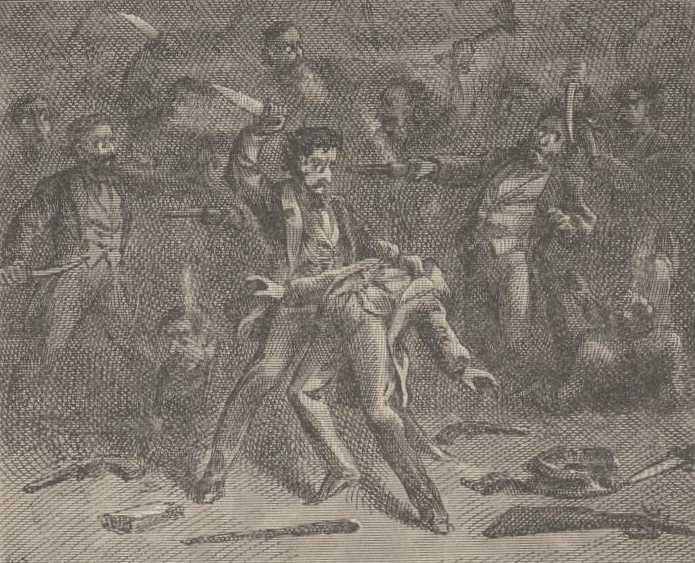
He said, "You'll like this place when you get used to it."
I said, "I'll have to get you to excuse me; I think maybe I might write to suit you after a while; as soon as I had had some practice and learned the language I am confident I could. But, to speak the plain truth, that sort of energy of expression has its inconveniences, and a, man is liable to interruption.
"You see that yourself. Vigorous writing is calculated to elevate the public, no doubt, but then I do not like to attract so much attention as it calls forth. I can't write with comfort when I am interrupted so much as I have been to-day. I like this berth well enough, but I don't like to be left here to wait on the customers. The experiences are novel, I grant you, and entertaining, too, after a fashion, but they are not judiciously distributed. A gentleman shoots at you through the window and cripples me; a bombshell comes down the stovepipe for your gratification and sends the stove door down my throat; a friend drops in to swap compliments with you, and freckles me with bullet-holes till my skin won't hold my principles; you go to dinner, and Jones comes with his cowhide, Gillespie throws me out of the window, Thompson tears all my clothes off, and an entire stranger takes my scalp with the easy freedom of an old acquaintance; and in less than five minutes all the blackguards in the country arrive in their war-paint, and proceed to scare the rest of me to death with their tomahawks. Take it altogether, I never had such a spirited time in all my life as I have had to-day. No; I like you, and I like your calm unruffled way of explaining things to the customers, but you see I am not used to it. The Southern heart is too impulsive; Southern hospitality is too lavish with the stranger. The paragraphs which I have written to-day, and into whose cold sentences your masterly hand has infused the fervent spirit of Tennesseean journalism, will wake up another nest of hornets. All that mob of editors will come—and they will come hungry, too, and want somebody for breakfast. I shall have to bid you adieu. I decline to be present at these festivities. I came South for my health, I will go back on the same errand, and suddenly. Tennesseean journalism is too stirring for me."
After which we parted with mutual regret, and I took apartments at the hospital.
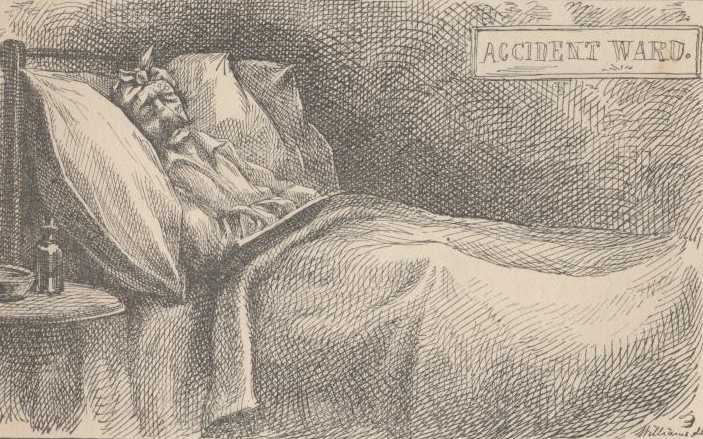
THE STORY OF THE BAD LITTLE BOY
[written about 1865]
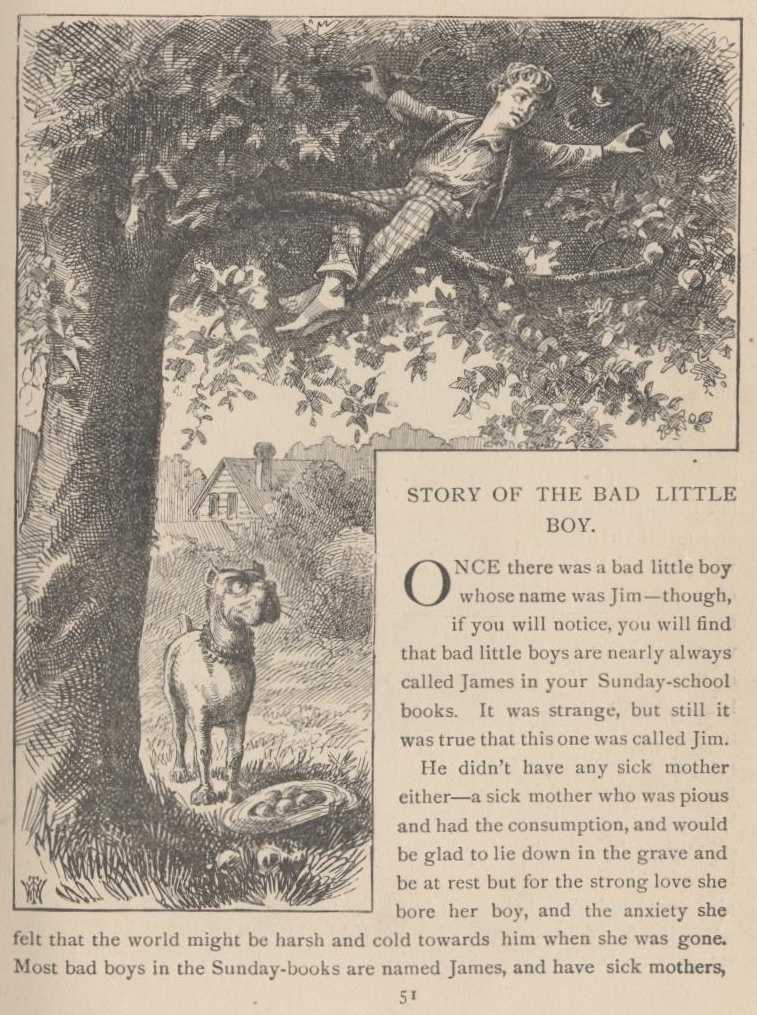
Once there was a bad little boy whose name was Jim—though, if you will notice, you will find that bad little boys are nearly always called James in your Sunday-school books. It was strange, but still it was true, that this one was called Jim.
He didn't have any sick mother, either—a sick mother who was pious and had the consumption, and would be glad to lie down in the grave and be at rest but for the strong love she bore her boy, and the anxiety she felt that the world might be harsh and cold toward him when she was gone. Most bad boys in the Sunday books are named James, and have sick mothers, who teach them to say, "Now, I lay me down," etc., and sing them to sleep with sweet, plaintive voices, and then kiss them good night, and kneel down by the bedside and weep. But it was different with this fellow. He was named Jim, and there wasn't anything the matter with his mother—no consumption, nor anything of that kind. She was rather stout than otherwise, and she was not pious; moreover, she was not anxious on Jim's account. She said if he were to break his neck it wouldn't be much loss. She always spanked Jim to sleep, and she never kissed him good night; on the contrary, she boxed his ears when she was ready to leave him.
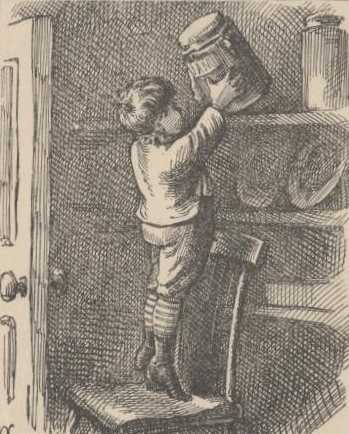
Once this little bad boy stole the key of the pantry, and slipped in there and helped himself to some jam, and filled up the vessel with tar, so that his mother would never know the difference; but all at once a terrible feeling didn't come over him, and something didn't seem to whisper to him, "Is it right to disobey my mother? Isn't it sinful to do this? Where do bad little boys go who gobble up their good kind mother's jam?" and then he didn't kneel down all alone and promise never to be wicked any more, and rise up with a light, happy heart, and go and tell his mother all about it, and beg her forgiveness, and be blessed by her with tears of pride and thankfulness in her eyes. No; that is the way with all other bad boys in the books; but it happened otherwise with this Jim, strangely enough. He ate that jam, and said it was bully, in his sinful, vulgar way; and he put in the tar, and said that was bully also, and laughed, and observed "that the old woman would get up and snort" when she found it out; and when she did find it out, he denied knowing anything about it, and she whipped him severely, and he did the crying himself. Everything about this boy was curious—everything turned out differently with him from the way it does to the bad Jameses in the books.
Once he climbed up in Farmer Acorn's apple tree to steal apples, and the limb didn't break, and he didn't fall and break his arm, and get torn by the farmer's great dog, and then languish on a sickbed for weeks, and repent and become good. Oh, no; he stole as many apples as he wanted and came down all right; and he was all ready for the dog, too, and knocked him endways with a brick when he came to tear him. It was very strange—nothing like it ever happened in those mild little books with marbled backs, and with pictures in them of men with swallow-tailed coats and bell-crowned hats, and pantaloons that are short in the legs, and women with the waists of their dresses under their arms, and no hoops on. Nothing like it in any of the Sunday-school books.
Once he stole the teacher's penknife, and, when he was afraid it would be found out and he would get whipped, he slipped it into George Wilson's cap poor Widow Wilson's son, the moral boy, the good little boy of the village, who always obeyed his mother, and never told an untruth, and was fond of his lessons, and infatuated with Sunday-school. And when the knife dropped from the cap, and poor George hung his head and blushed, as if in conscious guilt, and the grieved teacher charged the theft upon him, and was just in the very act of bringing the switch down upon his trembling shoulders, a white-haired, improbable justice of the peace did not suddenly appear in their midst, and strike an attitude and say, "Spare this noble boy—there stands the cowering culprit! I was passing the school door at recess, and, unseen myself, I saw the theft committed!" And then Jim didn't get whaled, and the venerable justice didn't read the tearful school a homily, and take George by the hand and say such boy deserved to be exalted, and then tell him come and make his home with him, and sweep out the office, and make fires, and run errands, and chop wood, and study law, and help his wife do household labors, and have all the balance of the time to play and get forty cents a month, and be happy. No it would have happened that way in the books, but didn't happen that way to Jim. No meddling old clam of a justice dropped in to make trouble, and so the model boy George got thrashed, and Jim was glad of it because, you know, Jim hated moral boys. Jim said he was "down on them milksops." Such was the coarse language of this bad, neglected boy.
But the strangest thing that ever happened to Jim was the time he went boating on Sunday, and didn't get drowned, and that other time that he got caught out in the storm when he was fishing on Sunday and didn't get struck by lightning. Why, you might look, and look, all through the Sunday-school books from now till next Christmas, and you would never come across anything like this. Oh, no; you would find that all the bad boys who go boating on Sunday invariably get drowned; and all the bad boys who get caught out in storms when they are fishing on Sunday infallibly get struck by lightning. Boats with bad boys in them always upset on Sunday, and it always storms when bad boys go fishing on the Sabbath. How this Jim ever escaped is a mystery to me.
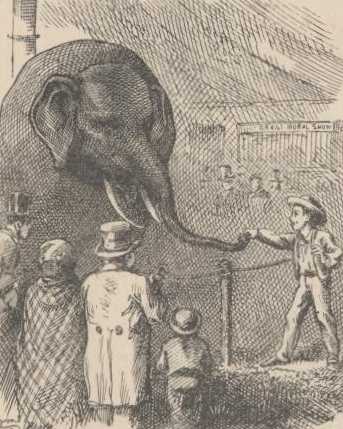
This Jim bore a charmed life—that must have been the way of it. Nothing could hurt him. He even gave the elephant in the menagerie a plug of tobacco, and the elephant didn't knock the top of his head off with his trunk. He browsed around the cupboard after essence-of peppermint, and didn't make a mistake and drink aqua fortis. He stole his father's gun and went hunting on the Sabbath, and didn't shoot three or four of his fingers off. He struck his little sister on the temple with his fist when he was angry, and she didn't linger in pain through long summer days, and die with sweet words of forgiveness upon her lips that redoubled the anguish of his breaking heart. No; she got over it. He ran off and went to sea at last, and didn't come back and find himself sad and alone in the world, his loved ones sleeping in the quiet churchyard, and the vine-embowered home of his boyhood tumbled down and gone to decay. Ah, no; he came home as drunk as a piper, and got into the station-house the first thing.
And he grew up and married, and raised a large family, and brained them all with an ax one night, and got wealthy by all manner of cheating and rascality; and now he is the infernalest wickedest scoundrel in his native village, and is universally respected, and belongs to the legislature.
So you see there never was a bad James in the Sunday-school books that had such a streak of luck as this sinful Jim with the charmed life.
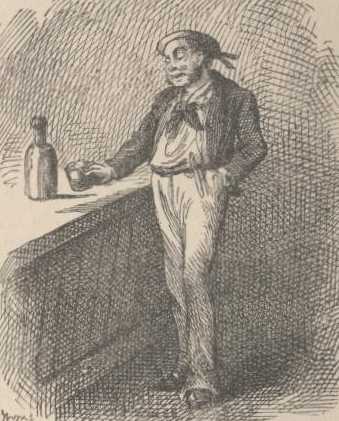
THE STORY OF THE GOOD LITTLE BOY
[Written about 1865]
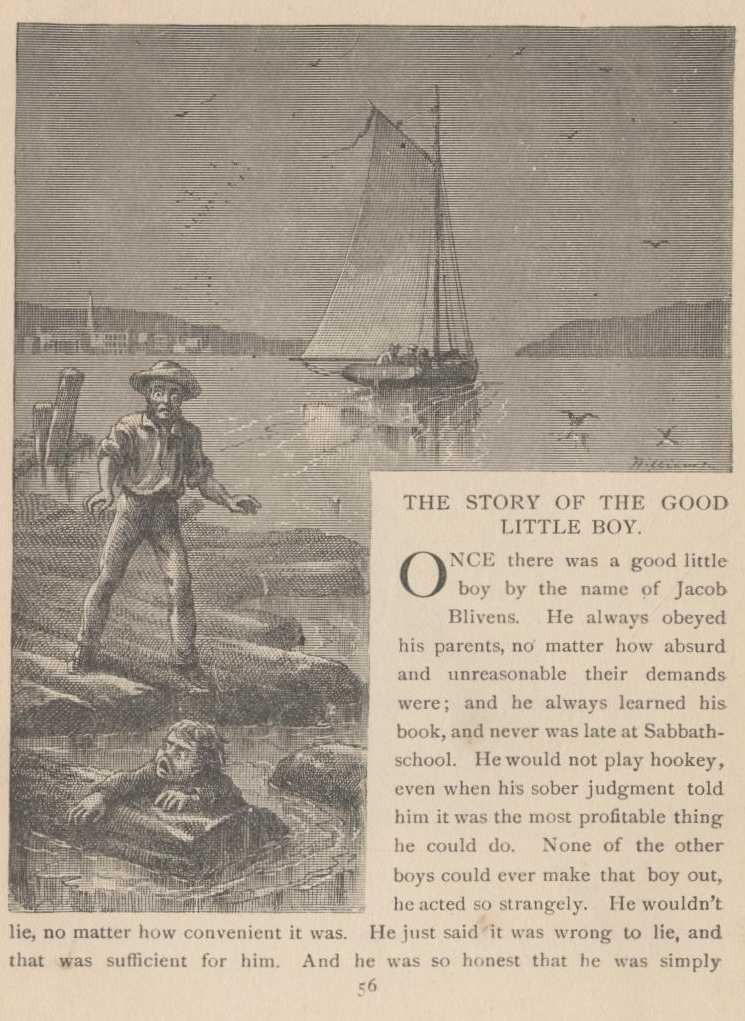
Once there was a good little boy by the name of Jacob Blivens. He always obeyed his parents, no matter how absurd and unreasonable their demands were; and he always learned his book, and never was late at Sabbath-school. He would not play hookey, even when his sober judgment told him it was the most profitable thing he could do. None of the other boys could ever make that boy out, he acted so strangely. He wouldn't lie, no matter how convenient it was. He just said it was wrong to lie, and that was sufficient for him. And he was so honest that he was simply ridiculous. The curious ways that that Jacob had, surpassed everything. He wouldn't play marbles on Sunday, he wouldn't rob birds' nests, he wouldn't give hot pennies to organ-grinders' monkeys; he didn't seem to take any interest in any kind of rational amusement. So the other boys used to try to reason it out and come to an understanding of him, but they couldn't arrive at any satisfactory conclusion. As I said before, they could only figure out a sort of vague idea that he was "afflicted," and so they took him under their protection, and never allowed any harm to come to him.
This good little boy read all the Sunday-school books; they were his greatest delight. This was the whole secret of it. He believed in the good little boys they put in the Sunday-school book; he had every confidence in them. He longed to come across one of them alive once; but he never did. They all died before his time, maybe. Whenever he read about a particularly good one he turned over quickly to the end to see what became of him, because he wanted to travel thousands of miles and gaze on him; but it wasn't any use; that good little boy always died in the last chapter, and there was a picture of the funeral, with all his relations and the Sunday-school children standing around the grave in pantaloons that were too short, and bonnets that were too large, and everybody crying into handkerchiefs that had as much as a yard and a half of stuff in them. He was always headed off in this way. He never could see one of those good little boys on account of his always dying in the last chapter.
Jacob had a noble ambition to be put in a Sunday school book. He wanted to be put in, with pictures representing him gloriously declining to lie to his mother, and her weeping for joy about it; and pictures representing him standing on the doorstep giving a penny to a poor beggar-woman with six children, and telling her to spend it freely, but not to be extravagant, because extravagance is a sin; and pictures of him magnanimously refusing to tell on the bad boy who always lay in wait for him around the corner as he came from school, and welted him so over the head with a lath, and then chased him home, saying, "Hi! hi!" as he proceeded. That was the ambition of young Jacob Blivens. He wished to be put in a Sunday-school book. It made him feel a lithe uncomfortable sometimes when he reflected that the good little boys always died. He loved to live, you know, and this was the most unpleasant feature about being a Sunday-school-boo boy. He knew it was not healthy to be good. He knew it was more fatal than consumption to be so supernaturally good as the boys in the books were he knew that none of them had ever been able to stand it long, and it pained him to think that if they put him in a book he wouldn't ever see it, or even if they did get the book out before he died it wouldn't be popular without any picture of his funeral in the back part of it. It couldn't be much of a Sunday-school book that couldn't tell about the advice he gave to the community when he was dying. So at last, of course, he had to make up his mind to do the best he could under the circumstances—to live right, and hang on as long as he could and have his dying speech all ready when his time came.
But somehow nothing ever went right with the good little boy; nothing ever turned out with him the way it turned out with the good little boys in the books. They always had a good time, and the bad boys had the broken legs; but in his case there was a screw loose somewhere, and it all happened just the other way. When he found Jim Blake stealing apples, and went under the tree to read to him about the bad little boy who fell out of a neighbor's apple tree and broke his arm, Jim fell out of the tree, too, but he fell on him and broke his arm, and Jim wasn't hurt at all. Jacob couldn't understand that. There wasn't anything in the books like it.
And once, when some bad boys pushed a blind man over in the mud, and Jacob ran to help him up and receive his blessing, the blind man did not give him any blessing at all, but whacked him over the head with his stick and said he would like to catch him shoving him again, and then pretending to help him up. This was not in accordance with any of the books. Jacob looked them all over to see.
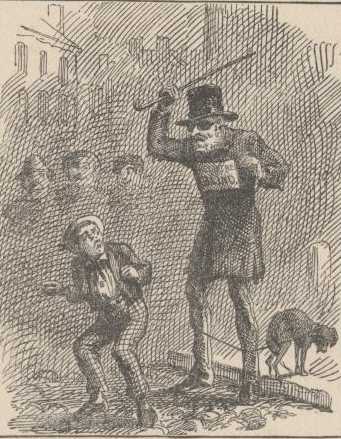
One thing that Jacob wanted to do was to find a lame dog that hadn't any place to stay, and was hungry and persecuted, and bring him home and pet him and have that dog's imperishable gratitude. And at last he found one and was happy; and he brought him home and fed him, but when he was going to pet him the dog flew at him and tore all the clothes off him except those that were in front, and made a spectacle of him that was astonishing. He examined authorities, but he could not understand the matter. It was of the same breed of dogs that was in the books, but it acted very differently. Whatever this boy did he got into trouble. The very things the boys in the books got rewarded for turned out to be about the most unprofitable things he could invest in.
Once, when he was on his way to Sunday-school, he saw some bad boys starting off pleasuring in a sailboat. He was filled with consternation, because he knew from his reading that boys who went sailing on Sunday invariably got drowned. So he ran out on a raft to warn them, but a log turned with him and slid him into the river. A man got him out pretty soon, and the doctor pumped the water out of him, and gave him a fresh start with his bellows, but he caught cold and lay sick abed nine weeks. But the most unaccountable thing about it was that the bad boys in the boat had a good time all day, and then reached home alive and well in the most surprising manner. Jacob Blivens said there was nothing like these things in the books. He was perfectly dumfounded.
When he got well he was a little discouraged, but he resolved to keep on trying anyhow. He knew that so far his experiences wouldn't do to go in a book, but he hadn't yet reached the allotted term of life for good little boys, and he hoped to be able to make a record yet if he could hold on till his time was fully up. If everything else failed he had his dying speech to fall back on.
He examined his authorities, and found that it was now time for him to go to sea as a cabin-boy. He called on a ship-captain and made his application, and when the captain asked for his recommendations he proudly drew out a tract and pointed to the word, "To Jacob Blivens, from his affectionate teacher." But the captain was a coarse, vulgar man, and he said, "Oh, that be blowed! that wasn't any proof that he knew how to wash dishes or handle a slush-bucket, and he guessed he didn't want him." This was altogether the most extraordinary thing that ever happened to Jacob in all his life. A compliment from a teacher, on a tract, had never failed to move the tenderest emotions of ship-captains, and open the way to all offices of honor and profit in their gift it never had in any book that ever he had read. He could hardly believe his senses.

This boy always had a hard time of it. Nothing ever came out according to the authorities with him. At last, one day, when he was around hunting up bad little boys to admonish, he found a lot of them in the old iron-foundry fixing up a little joke on fourteen or fifteen dogs, which they had tied together in long procession, and were going to ornament with empty nitroglycerin cans made fast to their tails. Jacob's heart was touched. He sat down on one of those cans (for he never minded grease when duty was before him), and he took hold of the foremost dog by the collar, and turned his reproving eye upon wicked Tom Jones. But just at that moment Alderman McWelter, full of wrath, stepped in. All the bad boys ran away, but Jacob Blivens rose in conscious innocence and began one of those stately little Sunday-school-book speeches which always commence with "Oh, sir!" in dead opposition to the fact that no boy, good or bad, ever starts a remark with "Oh, sir." But the alderman never waited to hear the rest. He took Jacob Blivens by the ear and turned him around, and hit him a whack in the rear with the flat of his hand; and in an instant that good little boy shot out through the roof and soared away toward the sun with the fragments of those fifteen dogs stringing after him like the tail of a kite. And there wasn't a sign of that alderman or that old iron-foundry left on the face of the earth; and, as for young Jacob Blivens, he never got a chance to make his last dying speech after all his trouble fixing it up, unless he made it to the birds; because, although the bulk of him came down all right in a tree-top in an adjoining county, the rest of him was apportioned around among four townships, and so they had to hold five inquests on him to find out whether he was dead or not, and how it occurred. You never saw a boy scattered so.—[This glycerin catastrophe is borrowed from a floating newspaper item, whose author's name I would give if I knew it.—M. T.]
Thus perished the good little boy who did the best he could, but didn't come out according to the books. Every boy who ever did as he did prospered except him. His case is truly remarkable. It will probably never be accounted for.
A COUPLE OF POEMS BY TWAIN AND MOORE
[written about 1865]
THOSE EVENING BELLS
| BY THOMAS MOORE Those evening bells! those evening bells! How many a tale their music tells Of youth, and home, and that sweet time When last I heard their soothing chime. Those joyous hours are passed away; And many a heart that then was gay, Within the tomb now darkly dwells, And hears no more those evening bells. And so 'twill be when I am gone That tuneful peal will still ring on; While other bards shall walk these dells, And sing your praise, sweet evening bells. THOSE ANNUAL BILLSBY MARK TWAIN These annual bills! these annual bills! How many a song their discord trills Of "truck" consumed, enjoyed, forgot, Since I was skinned by last year's lot! Those joyous beans are passed away; Those onions blithe, O where are they? Once loved, lost, mourned—now vexing ILLS Your shades troop back in annual bills! And so 'twill be when I'm aground These yearly duns will still go round, While other bards, with frantic quills, Shall damn and damn these annual bills! |
NIAGARA
[written about 1871]

Niagara Falls is a most enjoyable place of resort. The hotels are excellent, and the prices not at all exorbitant. The opportunities for fishing are not surpassed in the country; in fact, they are not even equaled elsewhere. Because, in other localities, certain places in the streams are much better than others; but at Niagara one place is just as good as another, for the reason that the fish do not bite anywhere, and so there is no use in your walking five miles to fish, when you can depend on being just as unsuccessful nearer home. The advantages of this state of things have never heretofore been properly placed before the public.
The weather is cool in summer, and the walks and drives are all pleasant and none of them fatiguing. When you start out to "do" the Falls you first drive down about a mile, and pay a small sum for the privilege of looking down from a precipice into the narrowest part of the Niagara River. A railway "cut" through a hill would be as comely if it had the angry river tumbling and foaming through its bottom. You can descend a staircase here a hundred and fifty feet down, and stand at the edge of the water. After you have done it, you will wonder why you did it; but you will then be too late.
The guide will explain to you, in his blood-curdling way, how he saw the little steamer, Maid of the Mist, descend the fearful rapids—how first one paddle-box was out of sight behind the raging billows and then the other, and at what point it was that her smokestack toppled overboard, and where her planking began to break and part asunder—and how she did finally live through the trip, after accomplishing the incredible feat of traveling seventeen miles in six minutes, or six miles in seventeen minutes, I have really forgotten which. But it was very extraordinary, anyhow. It is worth the price of admission to hear the guide tell the story nine times in succession to different parties, and never miss a word or alter a sentence or a gesture.
Then you drive over to Suspension Bridge, and divide your misery between the chances of smashing down two hundred feet into the river below, and the chances of having the railway-train overhead smashing down onto you. Either possibility is discomforting taken by itself, but, mixed together, they amount in the aggregate to positive unhappiness.
On the Canada side you drive along the chasm between long ranks of photographers standing guard behind their cameras, ready to make an ostentatious frontispiece of you and your decaying ambulance, and your solemn crate with a hide on it, which you are expected to regard in the light of a horse, and a diminished and unimportant background of sublime Niagara; and a great many people have the incredible effrontery or the native depravity to aid and abet this sort of crime.
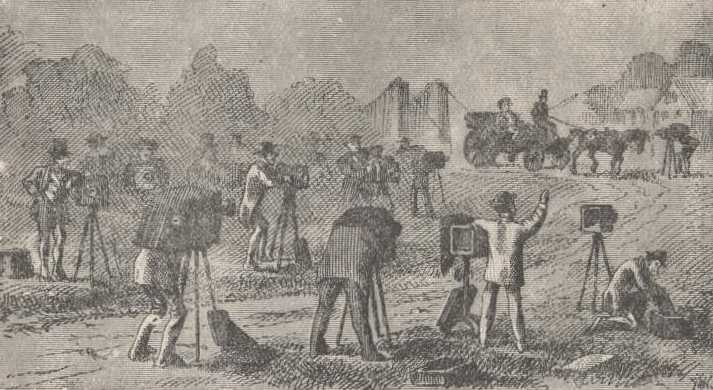
Any day, in the hands of these photographers, you may see stately pictures of papa and mamma, Johnny and Bub and Sis or a couple of country cousins, all smiling vacantly, and all disposed in studied and uncomfortable attitudes in their carriage, and all looming up in their awe-inspiring imbecility before the snubbed and diminished presentment of that majestic presence whose ministering spirits are the rainbows, whose voice is the thunder, whose awful front is veiled in clouds, who was monarch here dead and forgotten ages before this sackful of small reptiles was deemed temporarily necessary to fill a crack in the world's unnoted myriads, and will still be monarch here ages and decades of ages after they shall have gathered themselves to their blood-relations, the other worms, and been mingled with the unremembering dust.
There is no actual harm in making Niagara a background whereon to display one's marvelous insignificance in a good strong light, but it requires a sort of superhuman self-complacency to enable one to do it.
When you have examined the stupendous Horseshoe Fall till you are satisfied you cannot improve on it, you return to America by the new Suspension Bridge, and follow up the bank to where they exhibit the Cave of the Winds.
Here I followed instructions, and divested myself of all my clothing, and put on a waterproof jacket and overalls. This costume is picturesque, but not beautiful. A guide, similarly dressed, led the way down a flight of winding stairs, which wound and wound, and still kept on winding long after the thing ceased to be a novelty, and then terminated long before it had begun to be a pleasure. We were then well down under the precipice, but still considerably above the level of the river.
We now began to creep along flimsy bridges of a single plank, our persons shielded from destruction by a crazy wooden railing, to which I clung with both hands—not because I was afraid, but because I wanted to. Presently the descent became steeper and the bridge flimsier, and sprays from the American Fall began to rain down on us in fast increasing sheets that soon became blinding, and after that our progress was mostly in the nature of groping. Nova a furious wind began to rush out from behind the waterfall, which seemed determined to sweep us from the bridge, and scatter us on the rocks and among the torrents below. I remarked that I wanted to go home; but it was too late. We were almost under the monstrous wall of water thundering down from above, and speech was in vain in the midst of such a pitiless crash of sound.

In another moment the guide disappeared behind the deluge, and bewildered by the thunder, driven helplessly by the wind, and smitten by the arrowy tempest of rain, I followed. All was darkness. Such a mad storming, roaring, and bellowing of warring wind and water never crazed my ears before. I bent my head, and seemed to receive the Atlantic on my back. The world seemed going to destruction. I could not see anything, the flood poured down savagely. I raised my head, with open mouth, and the most of the American cataract went down my throat. If I had sprung a leak now I had been lost. And at this moment I discovered that the bridge had ceased, and we must trust for a foothold to the slippery and precipitous rocks. I never was so scared before and survived it. But we got through at last, and emerged into the open day, where we could stand in front of the laced and frothy and seething world of descending water, and look at it. When I saw how much of it there was, and how fearfully in earnest it was, I was sorry I had gone behind it.
The noble Red Man has always been a friend and darling of mine. I love to read about him in tales and legends and romances. I love to read of his inspired sagacity, and his love of the wild free life of mountain and forest, and his general nobility of character, and his stately metaphorical manner of speech, and his chivalrous love for the dusky maiden, and the picturesque pomp of his dress and accoutrements. Especially the picturesque pomp of his dress and accoutrements. When I found the shops at Niagara Falls full of dainty Indian beadwork, and stunning moccasins, and equally stunning toy figures representing human beings who carried their weapons in holes bored through their arms and bodies, and had feet shaped like a pie, I was filled with emotion. I knew that now, at last, I was going to come face to face with the noble Red Man.
A lady clerk in a shop told me, indeed, that all her grand array of curiosities were made by the Indians, and that they were plenty about the Falls, and that they were friendly, and it would not be dangerous to speak to them. And sure enough, as I approached the bridge leading over to Luna Island, I came upon a noble Son of the Forest sitting under a tree, diligently at work on a bead reticule. He wore a slouch hat and brogans, and had a short black pipe in his mouth. Thus does the baneful contact with our effeminate civilization dilute the picturesque pomp which is so natural to the Indian when far removed from us in his native haunts. I addressed the relic as follows:
"Is the Wawhoo-Wang-Wang of the Whack-a-Whack happy? Does the great Speckled Thunder sigh for the war-path, or is his heart contented with dreaming of the dusky maiden, the Pride of the Forest? Does the mighty Sachem yearn to drink the blood of his enemies, or is he satisfied to make bead reticules for the pappooses of the paleface? Speak, sublime relic of bygone grandeur—venerable ruin, speak!"

The relic said:
"An' is it mesilf, Dennis Hooligan, that ye'd be takon' for a dirty Injin, ye drawlin', lantern-jawed, spider-legged divil! By the piper that played before Moses, I'll ate ye!"
I went away from there.
By and by, in the neighborhood of the Terrapin Tower, I came upon a gentle daughter of the aborigines in fringed and beaded buckskin moccasins and leggins, seated on a bench with her pretty wares about her. She had just carved out a wooden chief that had a strong family resemblance to a clothes-pin, and was now boring a hole through his abdomen to put his bow through. I hesitated a moment, and then addressed her:
"Is the heart of the forest maiden heavy? Is the Laughing Tadpole lonely? Does she mourn over the extinguished council-fires of her race, and the vanished glory of her ancestors? Or does her sad spirit wander afar toward the hunting-grounds whither her brave Gobbler-of-the-Lightnings is gone? Why is my daughter silent? Has she ought against the paleface stranger?"
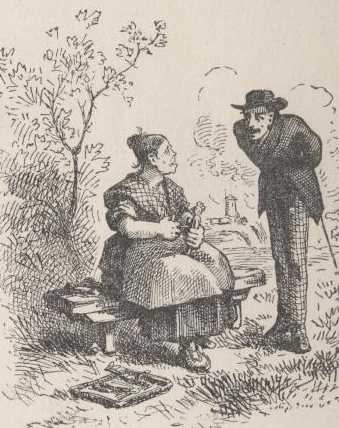
The maiden said:
"Faix, an' is it Biddy Malone ye dare to be callin' names? Lave this, or I'll shy your lean carcass over the cataract, ye sniveling blaggard!"
I adjourned from there also.
"Confound these Indians!" I said. "They told me they were tame; but, if appearances go for anything, I should say they were all on the warpath."
I made one more attempt to fraternize with them, and only one. I came upon a camp of them gathered in the shade of a great tree, making wampum and moccasins, and addressed them in the language of friendship:
"Noble Red Men, Braves, Grand Sachems, War Chiefs, Squaws, and High Muck-a-Mucks, the paleface from the land of the setting sun greets you! You, Beneficent Polecat—you, Devourer of Mountains—you, Roaring Thundergust—you, Bully Boy with a Glass eye—the paleface from beyond the great waters greets you all! War and pestilence have thinned your ranks and destroyed your once proud nation. Poker and seven-up, and a vain modern expense for soap, unknown to your glorious ancestors, have depleted your purses. Appropriating, in your simplicity, the property of others has gotten you into trouble. Misrepresenting facts, in your simple innocence, has damaged your reputation with the soulless usurper. Trading for forty-rod whisky, to enable you to get drunk and happy and tomahawk your families, has played the everlasting mischief with the picturesque pomp of your dress, and here you are, in the broad light of the nineteenth century, gotten up like the ragtag and bobtail of the purlieus of New York. For shame! Remember your ancestors! Recall their mighty deeds! Remember Uncas!—and Red jacket! and Hole in the Day!—and Whoopdedoodledo! Emulate their achievements! Unfurl yourselves under my banner, noble savages, illustrious guttersnipes—"
"Down wid him!" "Scoop the blaggard!" "Burn him!" "Bang him!" "Dhround him!"
It was the quickest operation that ever was. I simply saw a sudden flash in the air of clubs, brickbats, fists, bead-baskets, and moccasins—a single flash, and they all appeared to hit me at once, and no two of them in the same place. In the next instant the entire tribe was upon me. They tore half the clothes off me; they broke my arms and legs; they gave me a thump that dented the top of my head till it would hold coffee like a saucer; and, to crown their disgraceful proceedings and add insult to injury, they threw me over the Niagara Falls, and I got wet.
About ninety or a hundred feet from the top, the remains of my vest caught on a projecting rock, and I was almost drowned before I could get loose. I finally fell, and brought up in a world of white foam at the foot of the Fall, whose celled and bubbly masses towered up several inches above my head. Of course I got into the eddy. I sailed round and round in it forty-four times—chasing a chip and gaining on it—each round trip a half-mile—reaching for the same bush on the bank forty-four times, and just exactly missing it by a hair's-breadth every time.
At last a man walked down and sat down close to that bush, and put a pipe in his mouth, and lit a match, and followed me with one eye and kept the other on the match, while he sheltered it in his hands from the wind. Presently a puff of wind blew it out. The next time I swept around he said:
"Got a match?"
"Yes; in my other vest. Help me out, please."
"Not for Joe."
When I came round again, I said:
"Excuse the seemingly impertinent curiosity of a drowning man, but will you explain this singular conduct of yours?"
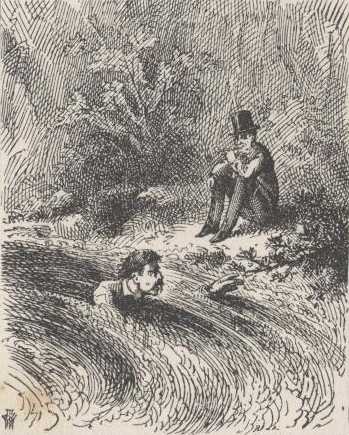
"With pleasure. I am the coroner. Don't hurry on my account. I can wait for you. But I wish I had a match."
I said: "Take my place, and I'll go and get you one."
He declined. This lack of confidence on his part created a coldness between us, and from that time forward I avoided him. It was my idea, in case anything happened to me, to so time the occurrence as to throw my custom into the hands of the opposition coroner on the American side.
At last a policeman came along, and arrested me for disturbing the peace by yelling at people on shore for help. The judge fined me, but had the advantage of him. My money was with my pantaloons, and my pantaloons were with the Indians.
Thus I escaped. I am now lying in a very critical condition. At least I am lying anyway—-critical or not critical. I am hurt all over, but I cannot tell the full extent yet, because the doctor is not done taking inventory. He will make out my manifest this evening. However, thus far he thinks only sixteen of my wounds are fatal. I don't mind the others.
Upon regaining my right mind, I said:
"It is an awful savage tribe of Indians that do the beadwork and moccasins for Niagara Falls, doctor. Where are they from?"
"Limerick, my son."
End of the Project Gutenberg EBook of Sketches New and Old, Part 1.
by Mark Twain (Samuel Clemens)
*** END OF THIS PROJECT GUTENBERG EBOOK SKETCHES NEW AND OLD, PART 1. ***
***** This file should be named 5836-h.htm or 5836-h.zip *****
This and all associated files of various formats will be found in:
http://www.gutenberg.net/5/8/3/5836/
Produced by David Widger
Updated editions will replace the previous one--the old editions
will be renamed.
Creating the works from public domain print editions means that no
one owns a United States copyright in these works, so the Foundation
(and you!) can copy and distribute it in the United States without
permission and without paying copyright royalties. Special rules,
set forth in the General Terms of Use part of this license, apply to
copying and distributing Project Gutenberg-tm electronic works to
protect the PROJECT GUTENBERG-tm concept and trademark. Project
Gutenberg is a registered trademark, and may not be used if you
charge for the eBooks, unless you receive specific permission. If you
do not charge anything for copies of this eBook, complying with the
rules is very easy. You may use this eBook for nearly any purpose
such as creation of derivative works, reports, performances and
research. They may be modified and printed and given away--you may do
practically ANYTHING with public domain eBooks. Redistribution is
subject to the trademark license, especially commercial
redistribution.
*** START: FULL LICENSE ***
THE FULL PROJECT GUTENBERG LICENSE
PLEASE READ THIS BEFORE YOU DISTRIBUTE OR USE THIS WORK
To protect the Project Gutenberg-tm mission of promoting the free
distribution of electronic works, by using or distributing this work
(or any other work associated in any way with the phrase "Project
Gutenberg"), you agree to comply with all the terms of the Full Project
Gutenberg-tm License (available with this file or online at
http://gutenberg.net/license).
Section 1. General Terms of Use and Redistributing Project Gutenberg-tm
electronic works
1.A. By reading or using any part of this Project Gutenberg-tm
electronic work, you indicate that you have read, understand, agree to
and accept all the terms of this license and intellectual property
(trademark/copyright) agreement. If you do not agree to abide by all
the terms of this agreement, you must cease using and return or destroy
all copies of Project Gutenberg-tm electronic works in your possession.
If you paid a fee for obtaining a copy of or access to a Project
Gutenberg-tm electronic work and you do not agree to be bound by the
terms of this agreement, you may obtain a refund from the person or
entity to whom you paid the fee as set forth in paragraph 1.E.8.
1.B. "Project Gutenberg" is a registered trademark. It may only be
used on or associated in any way with an electronic work by people who
agree to be bound by the terms of this agreement. There are a few
things that you can do with most Project Gutenberg-tm electronic works
even without complying with the full terms of this agreement. See
paragraph 1.C below. There are a lot of things you can do with Project
Gutenberg-tm electronic works if you follow the terms of this agreement
and help preserve free future access to Project Gutenberg-tm electronic
works. See paragraph 1.E below.
1.C. The Project Gutenberg Literary Archive Foundation ("the Foundation"
or PGLAF), owns a compilation copyright in the collection of Project
Gutenberg-tm electronic works. Nearly all the individual works in the
collection are in the public domain in the United States. If an
individual work is in the public domain in the United States and you are
located in the United States, we do not claim a right to prevent you from
copying, distributing, performing, displaying or creating derivative
works based on the work as long as all references to Project Gutenberg
are removed. Of course, we hope that you will support the Project
Gutenberg-tm mission of promoting free access to electronic works by
freely sharing Project Gutenberg-tm works in compliance with the terms of
this agreement for keeping the Project Gutenberg-tm name associated with
the work. You can easily comply with the terms of this agreement by
keeping this work in the same format with its attached full Project
Gutenberg-tm License when you share it without charge with others.
1.D. The copyright laws of the place where you are located also govern
what you can do with this work. Copyright laws in most countries are in
a constant state of change. If you are outside the United States, check
the laws of your country in addition to the terms of this agreement
before downloading, copying, displaying, performing, distributing or
creating derivative works based on this work or any other Project
Gutenberg-tm work. The Foundation makes no representations concerning
the copyright status of any work in any country outside the United
States.
1.E. Unless you have removed all references to Project Gutenberg:
1.E.1. The following sentence, with active links to, or other immediate
access to, the full Project Gutenberg-tm License must appear prominently
whenever any copy of a Project Gutenberg-tm work (any work on which the
phrase "Project Gutenberg" appears, or with which the phrase "Project
Gutenberg" is associated) is accessed, displayed, performed, viewed,
copied or distributed:
This eBook is for the use of anyone anywhere at no cost and with
almost no restrictions whatsoever. You may copy it, give it away or
re-use it under the terms of the Project Gutenberg License included
with this eBook or online at www.gutenberg.net
1.E.2. If an individual Project Gutenberg-tm electronic work is derived
from the public domain (does not contain a notice indicating that it is
posted with permission of the copyright holder), the work can be copied
and distributed to anyone in the United States without paying any fees
or charges. If you are redistributing or providing access to a work
with the phrase "Project Gutenberg" associated with or appearing on the
work, you must comply either with the requirements of paragraphs 1.E.1
through 1.E.7 or obtain permission for the use of the work and the
Project Gutenberg-tm trademark as set forth in paragraphs 1.E.8 or
1.E.9.
1.E.3. If an individual Project Gutenberg-tm electronic work is posted
with the permission of the copyright holder, your use and distribution
must comply with both paragraphs 1.E.1 through 1.E.7 and any additional
terms imposed by the copyright holder. Additional terms will be linked
to the Project Gutenberg-tm License for all works posted with the
permission of the copyright holder found at the beginning of this work.
1.E.4. Do not unlink or detach or remove the full Project Gutenberg-tm
License terms from this work, or any files containing a part of this
work or any other work associated with Project Gutenberg-tm.
1.E.5. Do not copy, display, perform, distribute or redistribute this
electronic work, or any part of this electronic work, without
prominently displaying the sentence set forth in paragraph 1.E.1 with
active links or immediate access to the full terms of the Project
Gutenberg-tm License.
1.E.6. You may convert to and distribute this work in any binary,
compressed, marked up, nonproprietary or proprietary form, including any
word processing or hypertext form. However, if you provide access to or
distribute copies of a Project Gutenberg-tm work in a format other than
"Plain Vanilla ASCII" or other format used in the official version
posted on the official Project Gutenberg-tm web site (www.gutenberg.net),
you must, at no additional cost, fee or expense to the user, provide a
copy, a means of exporting a copy, or a means of obtaining a copy upon
request, of the work in its original "Plain Vanilla ASCII" or other
form. Any alternate format must include the full Project Gutenberg-tm
License as specified in paragraph 1.E.1.
1.E.7. Do not charge a fee for access to, viewing, displaying,
performing, copying or distributing any Project Gutenberg-tm works
unless you comply with paragraph 1.E.8 or 1.E.9.
1.E.8. You may charge a reasonable fee for copies of or providing
access to or distributing Project Gutenberg-tm electronic works provided
that
- You pay a royalty fee of 20% of the gross profits you derive from
the use of Project Gutenberg-tm works calculated using the method
you already use to calculate your applicable taxes. The fee is
owed to the owner of the Project Gutenberg-tm trademark, but he
has agreed to donate royalties under this paragraph to the
Project Gutenberg Literary Archive Foundation. Royalty payments
must be paid within 60 days following each date on which you
prepare (or are legally required to prepare) your periodic tax
returns. Royalty payments should be clearly marked as such and
sent to the Project Gutenberg Literary Archive Foundation at the
address specified in Section 4, "Information about donations to
the Project Gutenberg Literary Archive Foundation."
- You provide a full refund of any money paid by a user who notifies
you in writing (or by e-mail) within 30 days of receipt that s/he
does not agree to the terms of the full Project Gutenberg-tm
License. You must require such a user to return or
destroy all copies of the works possessed in a physical medium
and discontinue all use of and all access to other copies of
Project Gutenberg-tm works.
- You provide, in accordance with paragraph 1.F.3, a full refund of any
money paid for a work or a replacement copy, if a defect in the
electronic work is discovered and reported to you within 90 days
of receipt of the work.
- You comply with all other terms of this agreement for free
distribution of Project Gutenberg-tm works.
1.E.9. If you wish to charge a fee or distribute a Project Gutenberg-tm
electronic work or group of works on different terms than are set
forth in this agreement, you must obtain permission in writing from
both the Project Gutenberg Literary Archive Foundation and Michael
Hart, the owner of the Project Gutenberg-tm trademark. Contact the
Foundation as set forth in Section 3 below.
1.F.
1.F.1. Project Gutenberg volunteers and employees expend considerable
effort to identify, do copyright research on, transcribe and proofread
public domain works in creating the Project Gutenberg-tm
collection. Despite these efforts, Project Gutenberg-tm electronic
works, and the medium on which they may be stored, may contain
"Defects," such as, but not limited to, incomplete, inaccurate or
corrupt data, transcription errors, a copyright or other intellectual
property infringement, a defective or damaged disk or other medium, a
computer virus, or computer codes that damage or cannot be read by
your equipment.
1.F.2. LIMITED WARRANTY, DISCLAIMER OF DAMAGES - Except for the "Right
of Replacement or Refund" described in paragraph 1.F.3, the Project
Gutenberg Literary Archive Foundation, the owner of the Project
Gutenberg-tm trademark, and any other party distributing a Project
Gutenberg-tm electronic work under this agreement, disclaim all
liability to you for damages, costs and expenses, including legal
fees. YOU AGREE THAT YOU HAVE NO REMEDIES FOR NEGLIGENCE, STRICT
LIABILITY, BREACH OF WARRANTY OR BREACH OF CONTRACT EXCEPT THOSE
PROVIDED IN PARAGRAPH F3. YOU AGREE THAT THE FOUNDATION, THE
TRADEMARK OWNER, AND ANY DISTRIBUTOR UNDER THIS AGREEMENT WILL NOT BE
LIABLE TO YOU FOR ACTUAL, DIRECT, INDIRECT, CONSEQUENTIAL, PUNITIVE OR
INCIDENTAL DAMAGES EVEN IF YOU GIVE NOTICE OF THE POSSIBILITY OF SUCH
DAMAGE.
1.F.3. LIMITED RIGHT OF REPLACEMENT OR REFUND - If you discover a
defect in this electronic work within 90 days of receiving it, you can
receive a refund of the money (if any) you paid for it by sending a
written explanation to the person you received the work from. If you
received the work on a physical medium, you must return the medium with
your written explanation. The person or entity that provided you with
the defective work may elect to provide a replacement copy in lieu of a
refund. If you received the work electronically, the person or entity
providing it to you may choose to give you a second opportunity to
receive the work electronically in lieu of a refund. If the second copy
is also defective, you may demand a refund in writing without further
opportunities to fix the problem.
1.F.4. Except for the limited right of replacement or refund set forth
in paragraph 1.F.3, this work is provided to you 'AS-IS' WITH NO OTHER
WARRANTIES OF ANY KIND, EXPRESS OR IMPLIED, INCLUDING BUT NOT LIMITED TO
WARRANTIES OF MERCHANTIBILITY OR FITNESS FOR ANY PURPOSE.
1.F.5. Some states do not allow disclaimers of certain implied
warranties or the exclusion or limitation of certain types of damages.
If any disclaimer or limitation set forth in this agreement violates the
law of the state applicable to this agreement, the agreement shall be
interpreted to make the maximum disclaimer or limitation permitted by
the applicable state law. The invalidity or unenforceability of any
provision of this agreement shall not void the remaining provisions.
1.F.6. INDEMNITY - You agree to indemnify and hold the Foundation, the
trademark owner, any agent or employee of the Foundation, anyone
providing copies of Project Gutenberg-tm electronic works in accordance
with this agreement, and any volunteers associated with the production,
promotion and distribution of Project Gutenberg-tm electronic works,
harmless from all liability, costs and expenses, including legal fees,
that arise directly or indirectly from any of the following which you do
or cause to occur: (a) distribution of this or any Project Gutenberg-tm
work, (b) alteration, modification, or additions or deletions to any
Project Gutenberg-tm work, and (c) any Defect you cause.
Section 2. Information about the Mission of Project Gutenberg-tm
Project Gutenberg-tm is synonymous with the free distribution of
electronic works in formats readable by the widest variety of computers
including obsolete, old, middle-aged and new computers. It exists
because of the efforts of hundreds of volunteers and donations from
people in all walks of life.
Volunteers and financial support to provide volunteers with the
assistance they need, is critical to reaching Project Gutenberg-tm's
goals and ensuring that the Project Gutenberg-tm collection will
remain freely available for generations to come. In 2001, the Project
Gutenberg Literary Archive Foundation was created to provide a secure
and permanent future for Project Gutenberg-tm and future generations.
To learn more about the Project Gutenberg Literary Archive Foundation
and how your efforts and donations can help, see Sections 3 and 4
and the Foundation web page at http://www.pglaf.org.
Section 3. Information about the Project Gutenberg Literary Archive
Foundation
The Project Gutenberg Literary Archive Foundation is a non profit
501(c)(3) educational corporation organized under the laws of the
state of Mississippi and granted tax exempt status by the Internal
Revenue Service. The Foundation's EIN or federal tax identification
number is 64-6221541. Its 501(c)(3) letter is posted at
http://pglaf.org/fundraising. Contributions to the Project Gutenberg
Literary Archive Foundation are tax deductible to the full extent
permitted by U.S. federal laws and your state's laws.
The Foundation's principal office is located at 4557 Melan Dr. S.
Fairbanks, AK, 99712., but its volunteers and employees are scattered
throughout numerous locations. Its business office is located at
809 North 1500 West, Salt Lake City, UT 84116, (801) 596-1887, email
business@pglaf.org. Email contact links and up to date contact
information can be found at the Foundation's web site and official
page at http://pglaf.org
For additional contact information:
Dr. Gregory B. Newby
Chief Executive and Director
gbnewby@pglaf.org
Section 4. Information about Donations to the Project Gutenberg
Literary Archive Foundation
Project Gutenberg-tm depends upon and cannot survive without wide
spread public support and donations to carry out its mission of
increasing the number of public domain and licensed works that can be
freely distributed in machine readable form accessible by the widest
array of equipment including outdated equipment. Many small donations
($1 to $5,000) are particularly important to maintaining tax exempt
status with the IRS.
The Foundation is committed to complying with the laws regulating
charities and charitable donations in all 50 states of the United
States. Compliance requirements are not uniform and it takes a
considerable effort, much paperwork and many fees to meet and keep up
with these requirements. We do not solicit donations in locations
where we have not received written confirmation of compliance. To
SEND DONATIONS or determine the status of compliance for any
particular state visit http://pglaf.org
While we cannot and do not solicit contributions from states where we
have not met the solicitation requirements, we know of no prohibition
against accepting unsolicited donations from donors in such states who
approach us with offers to donate.
International donations are gratefully accepted, but we cannot make
any statements concerning tax treatment of donations received from
outside the United States. U.S. laws alone swamp our small staff.
Please check the Project Gutenberg Web pages for current donation
methods and addresses. Donations are accepted in a number of other
ways including including checks, online payments and credit card
donations. To donate, please visit: http://pglaf.org/donate
Section 5. General Information About Project Gutenberg-tm electronic
works.
Professor Michael S. Hart is the originator of the Project Gutenberg-tm
concept of a library of electronic works that could be freely shared
with anyone. For thirty years, he produced and distributed Project
Gutenberg-tm eBooks with only a loose network of volunteer support.
Project Gutenberg-tm eBooks are often created from several printed
editions, all of which are confirmed as Public Domain in the U.S.
unless a copyright notice is included. Thus, we do not necessarily
keep eBooks in compliance with any particular paper edition.
Most people start at our Web site which has the main PG search facility:
http://www.gutenberg.net
This Web site includes information about Project Gutenberg-tm,
including how to make donations to the Project Gutenberg Literary
Archive Foundation, how to help produce our new eBooks, and how to
subscribe to our email newsletter to hear about new eBooks.

































